


















































Members of RC Mannargudi, RID 2981, have accommodated ironsmith families from N India in a college following the lockdown. They are being provided with groceries and vegetables for cooking.
10 A single Rotary club mobilises `11 crore to feed Mumbai’s hungry
An account of how RC Mumbai Queen’s Necklace is feeding six million hungry people during the lockdown.
16 during lockdown
Nothing can stop this club from executing this 12-year-long project of feeding the elderly with fresh hot meals.
20 An Australian toilet warrior bats for WinS in India
Read about Mark Balla from Australia who is passionate about building toilets in India and other developing countries.
26 Harsh Vardhan thanks Rotary India for help during the pandemic Senior Rotary leaders, on a web conference, update the Union Health Minister about Rotary’s relief work for people hit hard by the pandemic.
48 Zimbabwe Medical Mission does 500 surgeries
A 10-member Indian VTT treats 3,000 patients in Zimbabwe, Africa.
54 Quenching Bengaluru’s thirst
While in Bengaluru, head to the Brahmin’s
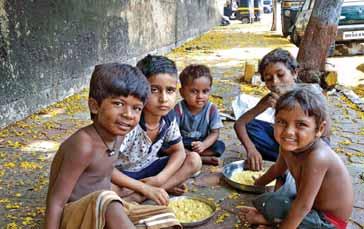
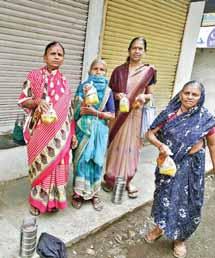
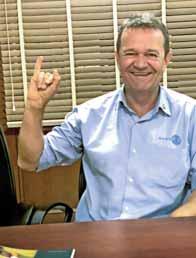
62
56 A memorable holiday in Taiwan
Explore the must-visit attractions in Taiwan, its architecture and art.

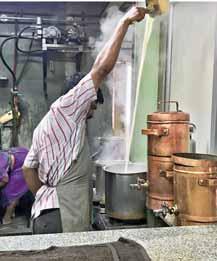

A unique project of RC Baroda Metro that
On the cover: A meal delivered by RC Mumbai Queen’s Necklace and its partners.

Thanksfor coming out with the e-magazine for April, which was a good move, especially with the majority of Rotarians staying at home. The remarks of RI President Mark Maloney in his message titled ‘Rotary cares for maternal and child health’ are impressive and an important necessity in developing nations. His message aims at removing the causes of malnutrition and diseases at the grassroot-level. And he offers a pathway for a strong foundation to the positive growth of the child, and in turn the community, nation and the world. A lot of resources can be saved by having a healthy mother and child. Maloney’s words are truly inspirational to all of us to take up the malnutrition challenge. Having successfully eradicated polio, we
Thecover photo in the March issue has women performing a traditional dance with serial lamps on their heads. One can’t help but praise their skills in balancing their overhead load with perfect poise and a smile.
In his message, RID Bharat Pandya has rightly said “water and sanitation go hand-in-hand and together they are the key to progress”, because if water is life, sanitation is a way of life.
Rotary has taken up the gigantic task of providing clean water and intensified conservation efforts by spending crores of rupees under its various projects benefitting thousands of people across India. The construction

can now gear up for a new challenge to do good in the world.
Vijay Hattiholi RC Hubli North RID 3170
Congratulations for successful publishing of the April issue of Rotary News and sharing the e-magazine. The coverage of 100 years of Rotary in India, including the articles on the Kolkata Summit, is excellent. For the e-magazine,
of check dams in the Punjab, Haryana and Rajasthan is one of the humongous tasks for which RI is joining hands with the government. Check dams were constructed in semi-hilly areas to check soil erosion during floods in the monsoon and thus land in the lower areas is saved, and more water is available for irrigating farmland. Hats off to Rotary for contributing to the success of Swachh Bharat and the Jal Shakti Mission of GOI as mentioned in the article Clean water and sanitation, a priority for Rotary.
RI President Maloney has said: “We need to grow Rotary by getting men and women of diverse backgrounds, who are willing not only to join us but also to serve.” Bravo, Rotarians go ahead with
I request you to cover more club activities across districts as it will encourage Rotarians to do more such projects. Keep up the good work.
Bhavesh Shah RC Madras Midtown RID 3232
Iread the magazine regularly and now due to Covid-19, I am reading its soft copy. I notice there is the Rotary logo in front and back pages, but not in the inner pages. I request you to carry the Rotary logo on top in all the pages as it will promote the Rotary spirit.
D A Naidu
RC Tuni Central — RID 3020
The April issue is really worth reading. I think this digital platform is better than print version and should continue with the same as this will avoid excessive use of paper which in turn will avoid
the mission and “Connect the world” to spread brotherhood, equality and peace all around.
Raj Kumar Kapoor RC Roopnagar — RID 3080
Nicely-compiled magazine
Asa new member, it is delightful and inspirational to find that Rotary News is compiled in such a professional manner and my appreciation for providing a colourful account of Rotary India Centennial Summit in Kolkata which showcased both service projects and cultural events. The article on President Elect Holger Knaack offered great insight into priorities that all Rotarians have to follow in the coming years. The article Rotarians must always wear their
deforestation. Let us save wood to save nature.
Pawan Panjwani
RC Kolhapur Sunrise RID 3170
ThanksRasheeda for sharing the April issue in the electronic form… every page is worth reading and loaded with information.
PDG Sunil Saraf RC Tezpur — RID 3240
Thisissue has excellent articles worth reading. The digital magazine is a good initiative, but do continue with the print issue too.
Niranjan Waichal
RC Kolhapur Sunrise RID 3170
It is good to promote the digital magazine instead of printing hard copies.
Indrakumar Goonetilleke RC Colombo North — RID 3220
pin: RIDN underlined the need to project ourselves to our communities. Membership Summary and Rotary at a glance are presented in such an orderly manner so that Rotarians can get an update. Several articles were nicely compiled and the message of RID Bharat Pandya was a perfect example of inspiration which ignites the minds of Rotarians to dedicate themselves more to the needs of society. It is heartening to know that the Kolkata Summit has initiated service projects worth $300 million and as RIPN Shekhar Mehta states, India’s membership is a silver lining in the annals of the Rotary movement and is a clarion call to further strengthen our duties to the communities we live in. The focus areas such as health, WASH
and TRF contributions have been the great assets for Rotary India. PRIP Rajendra Saboo has groomed several Rotary leaders in India over the decades with passion and each member has to imbibe such virtues in their early years of their Rotary journey.
Dr Jayasekharan V P
RC Payyanur — RID 3202
and Rotaract greetings to RIDN Venkatesh for his valuable suggestions in the article Rotarians must wear their pin always: RIDN. We appreciate his services to society.
G Sankar Ganesh, RC Srivilliputtur Green City — RID 3212
in India celebrate every event in a grand manner and the Kolkata Summit is one such example when it comes to Rotary conclaves in the country. The theme dance Hindustan meri jaan touched everybody’s heart with its traditional message of unity and cultural ethos. My Rotarian friends comprising 21 members from RID 3262 enjoyed many such moments at the Centennial Summit.
The editorial has turned the spotlight on the contributions of Indian Rotarians, whether it is TRF giving or service projects. Today Rotary clubs in India are much ahead of others in pursuit of humanitarian services. Your editorial reflects the spirit of Rotary in India.
Arun Kumar Dash RC Baripada — RID 3262
RIPE Knaack’s interesting insights
Theinterview with RIPE Holger Knaack under the headline “Business casual” was very interesting. He has thrown light on the need to induct both young and old members in Rotary. He is all for retaining the older members as they are good value to our organisation. He says, “There is no wrong age
to become a Rotarian whether 18 or 80 years.” There is no perfect size for a Rotary club, he says and has asked us not to put ceiling on the number of members in a Rotary club. He welcomes retirees to Rotary because they have skills, time and passion to contribute. However, young people should be inducted considering the future of Rotary.
This is encouraging for senior Rotarians like me who have been in Rotary for over 25 years utilising every opportunity to serve Rotary and community. We only request our services should not go unutilised in clubs and districts as it would benefit Rotary.
Ramaswamy N P RC Rasipuram — RID 2982
Itis interesting reading about MHM in the article Starting a dialogue on Menstruation. I am a President-elect and MHM is one of the projects I wish to promote and create awareness among the public. I am happy that I’ve got some new knowledge and ideas about MHM projects.
Betty Mutebi, RC Lukaya, Uganda and Tanzania — RID 9211
All the Rotary Hero awardees at the Kolkata Centennial Summit are known for their outstanding contributions towards society and despite all odds, these people went ahead with their service. I know Adhik Kadam, his work in settling the life of Kashmiri girls is valuable and noble work. I wish all of them a great success in future. Prashant Padmakar Bhalerao
Non-Rotarian
We welcome your feedback. Write to the Editor: rotarynews@rosaonline.org; rushbhagat@gmail.com Click on Rotary News Plus on our website www.rotarynewsonline.org to read about more Rotary projects.

Dear Rotarians, Rotaractors, and friends, Increasing our ability to adapt: That is one goal of our new Rotary Action Plan. And wow, have we seen that ability put to the test this year.
In March, Gay and I were to visit Zimbabwe, Turkey, and eight other countries over the course of 30 days. After participating in a medical mission in Zimbabwe and Commonwealth Week activities in London, on the 11th day, we were packing our suitcases for Switzerland and Liechtenstein.
While attending a dinner at the High Commission for Pakistan in London, we received word that it would be impossible to travel everywhere on our itinerary. So, instead of flying to Zurich, we returned to Evanston and One Rotary Center.
Throughout early March, the news about COVID-19 became increasingly serious throughout the world. Following the advice of local officials, we cancelled UN presidential conferences in Paris and Rome. Soon, the World Health Organisation declared the virus a global pandemic, and we consulted with authorities on more critical decisions. We asked all Rotary districts and clubs to curb face-to-face meetings until further notice and to hold virtual meetings instead. To the districts and clubs that have adapted so quickly, thank you.
The Rotary Board of Directors held its first-ever virtual meeting to make the most difficult decision of all, to cancel the 2020 Rotary International Convention.

Like the more than 20,000 registrants who planned to attend, I am disappointed. We acted to protect the health and safety of convention attendees and their families, friends, and colleagues, as well as those who call Honolulu home, and I am confident we made the right decision.
I want to thank the 2020 Honolulu Convention Committee, the Host Organisation Committee, the 2020 Honolulu Convention Promotion Committee, and Rotary staff for planning what would have been one of the best Rotary conventions yet. I appreciate their hard work.
This issue of The Rotarian was going to press as the decision about cancelling the convention was made, and many other decisions across the Rotary world were still up in the air. Future issues of The Rotarian and of Rotary’s regional magazines, along with Rotary’s social media channels, will keep you informed.
We began this Rotary year promoting the importance of the new Action Plan for all Rotarians and Rotaractors. Today, we are putting that plan into action out of necessity. That includes the possibility of a convention-like experience with you through a virtual event. We will have more to say about this in the near future.
The world is changing rapidly, and so must Rotary. Our adaptability and strength will help us navigate this experience. The world needs our leadership today more than ever. Truly, Rotary Connects the World.
Mark Daniel Maloney President, Rotary International

he speed, alacrity and heart with which the entire Rotary world, particularly Rotarians in India, responded to the COVID-19 pandemic is heart-warming. Without any nudging from anybody, India Rotarians quickly reached relief in terms of critical hospital equipment, sanitisers, masks, PPEs, and cooked meals to lakhs of impoverished migrant workers, daily wagers and homeless people across the country. These are times when organisations’ core values are tested, and during this horrific pandemic Rotarians proved Rotary’s central motto — Service Above Self — is more than mere words.
What is more, RI President Mark Maloney’s theme Rotary Connects the World has been tested during these trying times as never before. Rotarians across the world are coming together quickly to do meaningful work, and forging critical and valuable partnerships to reach relief to the worst affected. The Rotary Foundation quickly tweaked its grant models to offer a disaster management grant, under which all the 525 Rotary districts are being given a special grant of $25,000 for COVID-19 related relief work. For India it has approved global grants worth a whopping `7 crore, for supplying critical hospital equipment such as ventilators to treat patients infected by COVID-19.
In online interactions with both Union Health Minister Dr Harsh Vardhan and Environment Minister Prakash Javadekar, RIPN Shekhar Mehta disclosed that against a target of donating `25 crore to the PM CARES Fund, Rotarians had already donated `30 crore. If the amount donated by corporates headed by Rotarians were to be included, the sum would go well above `100 crore. Add to this the relief work — hospital and safety equipment and cooked food and foodgrains — and Indian Rotarians had
done relief work totalling over `75 crore by mid-April. All this by dipping into their personal savings.
The warmth and camaraderie that reigned at these meetings was palpable. Dr Vardhan has of course worked closely with the Rotarians of Delhi, as the State’s Health Minister for polio eradication and acknowledged Rotary’s help in ridding India of Polio. And Javadekar welcomed Rotary’s offer to green India through massive tree planting.
That brings us to the one lesson this pandemic should teach us. The way the trees at home and plants on my terrace are blooming — a dozen-odd pomegranates suddenly appearing from nowhere, lemons making an appearance, the sickly karuvepillai (kari patta) plant transforming into a smiling bright green umbrella of fresh leaves, the return of the parrots and other birds, the spectacular sunsets every single evening during the last few weeks, is a message of hope among the doom and gloom. As we, petrified human beings have locked ourselves up, our car keys as well as dreams of buying bigger, fancier models, gathering dust, airplanes remain parked in their hangars, and huge cruise ships have lost their charm and cheer, Mother Earth is slowly reclaiming her space, and its other inhabitants are able to breathe, live, and thrive.
It required a tiny virus to bring our arrogance down several notches and give back some place and privileges we had usurped to other forms of life on our planet. The real test will come when this pandemic is behind us, as it is bound to be. Hopefully a better clone of the arrogant, selfish human being will emerge when we slowly begin to come out of our homes… and along with physical freedom, our locked down brains, hearts and souls will emerge free too.
Rasheeda Bhagat
RI Dist 2981
RI Dist 2982
RI Dist 3000
RI Dist 3011
RI Dist 3012
RI Dist 3020
RI Dist 3030
DG N Manimaran
DG Natesan A K
DG Dr A Zameer Pasha
DG Suresh Bhasin
DG Deepak Gupta
DG M Veerabhadra Reddy
DG Rajendra Madhukar Bhamre
RI Dist 3040 DG Dhiran Datta
RI Dist 3053
DG Harish Kumar Gaur
RI Dist 3054 DG Bina Ashish Desai
RI Dist 3060 DG Anish Shah
RI Dist 3070 DG Sunil Nagpal
RI Dist 3080 DG Jitendra Dhingra
RI Dist 3090 DG Rajeev Garg
RI Dist 3100 DG Hari Gupta
RI Dist 3110 DG Kishor Katru
RI Dist 3120 DG Sanjay Agrawal
RI Dist 3131 DG Ravee Dhotre
RI Dist 3132 DG Suhas Laxmanrao Vaidya
RI Dist 3141 DG Harjit Singh Talwar
RI Dist 3142 DG Dr Mohan Chandavarkar
RI Dist 3150 DG Pandi Sivannarayana Rao
RI Dist 3160 DG Nayan S Patil
RI Dist 3170 DG Dr Girish R Masurkar
RI Dist 3181 DG Joseph Mathew
RI Dist 3182 DG Ramesh B N
RI Dist 3190 DG Dr Sameer Hariani
RI Dist 3201 DG R Madhav Chandran
RI Dist 3202 DG A Karthikeyan
RI Dist 3211 DG Shirish Kesavan
RI Dist 3212 DG S Sheik Saleem
RI Dist 3231 DG Sridar Balaraman
RI Dist 3232 DG G Chandramohan
RI Dist 3240
DG Dr Debasish Das
RI Dist 3250 DG Gopal Khemka
RI Dist 3261 DG Ranjeet S Saini
RI Dist 3262 DG Debasish Mishra
RI Dist 3291 DG Ajay Agarwal
Printed by P T Prabhakar at Rasi Graphics Pvt Ltd, 40, Peters Road, Royapettah, Chennai - 600 014, India, and published by P T Prabhakar on behalf of Rotary News Trust from Dugar Towers, 3rd Flr, 34, Marshalls Road, Egmore, Chennai 600 008. Editor: Rasheeda Bhagat.
The views expressed by contributors are not necessarily those of the Editor orTrustees of Rotary News Trust (RNT) or Rotary International (RI). No liability can be accepted for any loss arising from editorial or advertisement content. Contributions –original content – are welcome but the Editor reserves the right to edit for clarity or length. Content can be reproduced, but with permission from RNT.
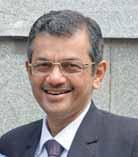
Good thinking and good health are our two precious possessions. The COVID-19 pandemic has brought home the fact that good health is our most precious possession. If health is good all else can follow. The pandemic has not only caused innumerable casualties and grief, but has sent economies on a downward spiral. But friends ‘this, too, shall pass.’ If we look at the positive side virtual meetings have become the new norm especially for Rotary clubs and districts. Sitting in our houses we are still connected socially. Of course ‘physical distancing’ is here to stay for a long time. I compliment the club and district leaders who are using the virtual platform for online meetings, remaining connected with Rotarians, for training events and fellowship too. This is the new normal. Rotary clubs and districts in our Zones have done remarkable work to mitigate the effects and sufferings due to this pandemic. By supplying PPEs, masks, sanitiser, vital equipment including ventilators, food for the migrants and front-line COVID warriors and extending mental health counseling Rotarians have lived upto our motto ‘Service Above Self’. My compliments to all Rotarians, club and district leaders, the Torchbearer Governors for the remarkable work done. And special compliments and thanks to all the frontline COVID warriors — healthcare professionals, police, government and private essential services staff, sanitation workers and all those who continue to work despite personal and family risk to ensure minimal disruption in our daily lives. Hats off to each and every one of them!
The post-COVID world will not be and should not be the same as before. The way we behave, work, eat, travel, meet and interact with one another, and our service projects, will all be different. And this change will not be a one-time process, but an ongoing process. If we adapt to and adopt this change we will see a brighter future for our organisation. For the first time in Rotary’s history we will have a ‘virtual RI convention’ from June 20–26, 2020. It promises to be an epoch-making event.
May is Youth Service Month. Rotary has always had a focused approach to youth. We believe youth is like white paper, they take any impression we make on them. Today our youth — our Rotaractors — are an integral part of Rotary. I ask Rotary and Rotaract to identify and work on mutual areas of interest and focus on our priorities. Rotary clubs and districts must harness the talent of Rotaractors and lay a strong foundation for Rotaract and Rotaract clubs. This will ensure ‘a small step for one club, a step forward for Rotaract and a giant leap for Rotary’. That will be the perfect Rotary-Rotaract connection.

Dr Bharat Pandya RI Director, 2019–21
We cannot always build the future for our youth, but we can build our youth for the future.
- Franklin D Roosevelt
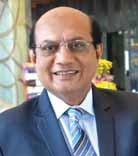
Youth is a phase of life where dreams are built and a bright future is envisioned. It is the age of discovery and dreams. These are the years to foster moral principles, construct value systems and begin an all-new journey on the righteous path. No doubt the nation’s strength is in its youth. The greatest wealth and strength of any nation is its youth. The future of a nation lies in the hands of its posterity. The quality of its youth determines the kind of future the nation will have. Therefore, if we want to ensure a bright future for our country, we first need to strengthen and empower our youth. The youth of a nation and society are its potential energy. They are the powerhouse and storehouse of infinite energy.
All clubs and districts are encouraged to undertake projects that support the fundamental needs of the GenNext by improving their life skills to ensure a better future, while recognising the diversity of their needs.
Interact clubs give students the opportunities to take initiatives, develop leadership and teamwork skills, community service ethics and international understanding.
Through the Rotary Youth Exchange, we hope to create a more interconnected and understanding world. One of Rotary’s primary goals is promoting world peace, and through the RYE, it aims to make the world a more peaceful place, one exchange at a time.
RYLA is a leadership development programme for young people who want to learn new skills, build their confidence, and have fun. Events range from oneday seminars to weeklong camps.
New Generations Service Exchange is a short-term, customisable programme for university students and professionals up to age 30. Participants can design exchanges that combine their professional goals with a humanitarian project.
Let me commend each one of you for being Covid Warriors, be it at the district, city or street-level. Rotarians have done their bit to help the needy in different ways. Thank you for answering our clarion call to give to the PM CARES Fund. Our cumulative donations to the fund have crossed `100 crore and our services another `100 crore. God bless you all.
Stay safe at home.

Kamal Sanghvi RI Director, 2019–21
Board of Permanent Trustees & Executive Committee
PRIP Rajendra K Saboo RI Dist 3080
PRIP Kalyan Banerjee RI Dist 3060
RIPN Shekhar Mehta RI Dist 3291
PRID Panduranga Setty RI Dist 3190
PRID Sushil Gupta RI Dist 3011
PRID Ashok Mahajan RI Dist 3141
PRID Yash Pal Das RI Dist 3080
PRID P T Prabhakar RI Dist 3232
PRID Dr Manoj D Desai RI Dist 3060
PRID C Basker RI Dist 3000
TRF Trustee Gulam A Vahanvaty RI Dist 3141
RID Dr Bharat Pandya RI Dist 3141
RID Kamal Sanghvi RI Dist 3250
Executive Committee Members (2019–20)
DG Deepak Gupta RI Dist 3012
Chair – Governors Council
DG Nayan Patil RI Dist 3160
Secretary – Governors Council
DG Dhiran Datta RI Dist 3040
Secretary – Executive Committee
DG Ajay Agarwal RI Dist 3291
Treasurer – Executive Committee
DG Rajendra Madhukar Bhamre RI Dist 3030
Member – Advisory Committee
ROTARY NEWS / ROTARY SAMACHAR Editor Rasheeda Bhagat
Senior Assistant Editor Jaishree Padmanabhan
ROTARY NEWS TRUST
3rd Floor, Dugar Towers, 34 Marshalls Road, Egmore Chennai 600 008, India. Phone : 044 42145666
e-mail: rotarynews@rosaonline.org
Website: www.rotarynewsonline.org
Now share articles from rotarynewsonline.org on WhatsApp.


It had to be in Mumbai… if not in the financial capital of India, where else can you raise `5.5 crore in 15 days to respond to the unprecedented COVID-19 calamity which left lakhs of migrant labourers, daily wage workers and other marginalised sections totally helpless when the country locked down on March 24 to check the spread of corona infection. And this was raised by one single Rotary club — RC Mumbai Queen’s Necklace — which rather befitting its name, now has a woman president in Sonal Jhaveri.
As the corona pandemic took India in its vicious grip, and it became evident that lakhs of people in Mumbai will
be left vulnerable and hungry, the “Miracles in Action” group of this prestigious club went into a huddle to strategise how the 179-member club could come to the rescue of migrant workers, daily wagers and other homeless residents of the metro.
The club members decided to initiate the project ‘Feed all in need’; past president and project chief Sanjiv Mehta explains that at first and on April 1 itself, the club made a humble beginning
by distributing 1,000 food packets. But they soon realised that this would only be a drop in the ocean as the need on the ground was colossal. They quickly ramped up the number from 1,000 daily meals to an astonishing 100,000 meals and then increased it some more — to 1.5 lakh, and finally 1.6 lakh meals a day!
As the initial lockdown period was three weeks, they first planned to supply 150,000 meals a day to several areas in the
Reliance Retail, through the Reliance Foundation gave us groceries worth `2 crore, TajSATS flight kitchen, Popular, Blue Sea, Thackers and FoodLink Kitchens gave further capacity to cook fresh, hot meals.
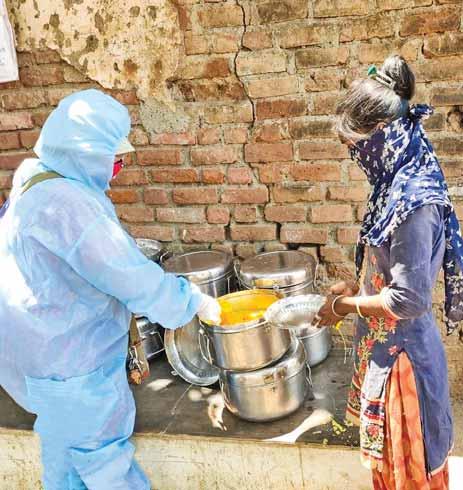
city, exploring the possibility of partnerships as preparing 1.5 lakh meals a day can’t be done in a single kitchen.
Says Vijay Shah, the club’s Director, PR: “So we started forging partnerships with seven NGOs who have 200 volunteers to reach the cooked meals to different areas of the city populated by migrant workers, daily wagers and other homeless people.”
What came in handy — this club obviously thinks of projects of scale — was an earlier club project where it had funded a `5 crore kitchen facility for serving midday meals to Municipal school children. This was inaugurated in Nov 2019, and with schools now closed, it was readily available
for making upto one lakh khichdi meals a day.
The club quickly partnered with the two operational kitchens at Mira Road and Mahul of the Annamrita-ISKCON Foundation which has a 14-year operational experience in preparing meals. “We also brought on board and struck partnerships with Reliance Retail which through the Reliance Foundation gave us groceries worth `2 crore, TajSATS flight kitchen, Popular, Blue Sea, Thackers and FoodLink Kitchens to get further capacity to cook fresh, hot, nutritious meals,”, says Shah.
While the preparation of meals was managed through these partnerships, the next question was the logistics involved in reaching
the freshly cooked food to the beneficiaries. “When people are scared to even let a courier or vegetable vendor enter their homes, who will actually deliver the meals, all the donations notwithstanding, was the next question,” says Paulomi Dhawan, Strategic Advisor to the club. Though not a Rotarian, her husband is a member, she is passionately involved in the community welfare work the club does.
In Mumbai, Chhoti si Asha and Nobody Ever Sleeps Hungry are two calamity meal and services provider specialists. They have mobilised over 100 volunteer donors who have again and again served in calamities across the country. Additional support was garnered from other NGOs like YMCA, Roti Ghar, Mumbai Responds etc, adds Club President Sonal.

So with RC Mumbai Queen’s Necklace as the principal coordinator and supporter, “the pyramid grew to over 200 grassroots volunteers, who cover multiple areas, ranging from arterial roads of Mumbai from Colaba to Palghar, to its bylanes. And we’ve got total support from the Mayor, MLAs, Corporators, the police, etc. The list keeps growing,” says Mehta, the project head.
Sonal adds they had supplied 1.6 lakh meals a day
When people were scared to even let a courier or vegetable vendor enter their homes, we struck partnerships to ensure meals are cooked and delivered.
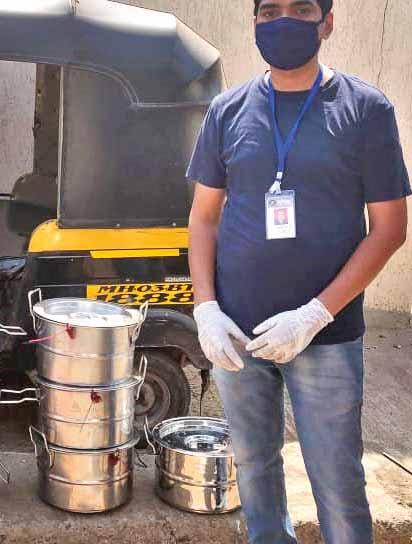

for 40 days, and had crossed the 6 million total. “We have decided to keep going with 125,000 meals and foodpackets a day till the third week of May.”
But the dilemma, muses Mehta, is that “even if the lockdown is lifted in May, there is no magic wand by waving which these labourers will get work the next day. So we are preparing foodgrains kits containing rice, flour, pulses, sugar, cooking oil, and spices, which we plan to distribute to about 30,000 needy people who will have to prepare their own meals.”
They have already identified about 15,000 such persons. But raising further funds is getting tougher and tougher.
As the Rotarians point out, they were able to raise the hefty amount of nearly `6 crore by dipping into their own savings, and persuading family, friends and their business contacts to donate, and Reliance Foundation to give them groceries worth `2 crore. By the first week of May, the club had mobilised a total of `11 crore. But resources are not infinite; the club members’ own businesses are shut and the sympathy and support pouring out from civil society might take a dip.
“But this project is so rewarding and has given us so much satisfaction that we will continue to do the best we can,” adds Sonal.
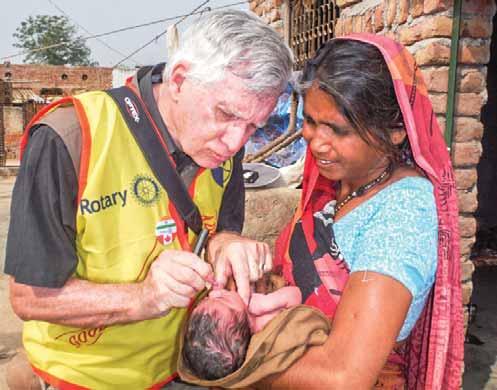
Over the coming months, the extensive polio infrastructure Rotary helped build will be used to support preparedness and response to the COVID-19 pandemic.
Building on decades of experience stopping polio outbreaks, Rotary and our partners have a critical role to play in protecting communities from this global pandemic, just as the we did with Ebola, yellow fever, and Avian flu. This truly represents the “Plus” in PolioPlus.
We must take every precaution to ensure that polio eradication activities do not contribute to COVID-19 transmission. In order to observe global guidance related to physical distancing and hygiene, the Global Polio
Eradication Initiative (GPEI) has advised countries to pause polio immunisation campaigns during the COVID-19 outbreak response.
While responding to COVID-19, Rotary and our GPEI partners will take every step possible to continue protecting children and avoid a resurgence of polio. We will maintain essential polio eradication work — including surveillance, immunisation in certain high-risk areas, and maintaining our vaccine supply — so that polio campaigns can begin without delay as soon as it is safe.
Responding to COVID-19 and polio are dual priorities. The most important thing that Rotary members can do to continue the fight to end polio is to
sustain our commitment to polio eradication and reach our fundraising goal of $50 million this year for polio — while also supporting COVID-19 response activities.
Districts are encouraged to consider giving District Designated Funds to PolioPlus. Donations to DDF are matched 1:1 by the World Fund, then 2:1 by the Gates Foundation for a total of a 6:1 match.
In the midst of a pandemic, it is understandable that attention to polio eradication will be diverted, but this makes it all the more vital for Rotarians to remain strongly committed to fighting polio and not let our progress erode.
©Rotary International
Rasheeda Bhagat
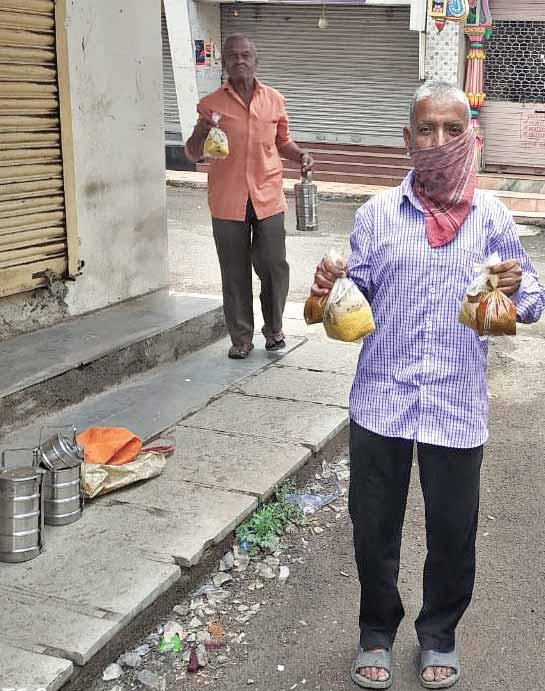
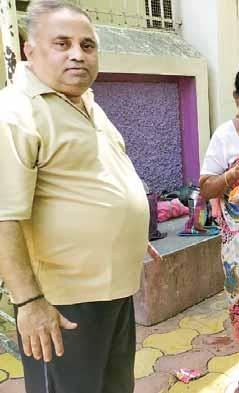
While the rest of India took its time in reacting to different and innovative ways of dealing with the COVID19 crisis and the three-week lockdown announced by Prime Minister Narendra Modi, members of RC Solapur were quick on their feet in ensuring the lockdown doesn’t affect the 100 senior citizens who have been getting a freshly cooked, hot meal from the club for over 12 years.
“As we were on the verge of lockdown, our club members approached the Solapur Commissioner of Police Ankush Shinde and put before him the plight of the 100 elderly citizens who are dependent on our Annapurna Yojana for their daily food. The CP, who himself has visited and appreciated our project in the past, had no second thoughts and granted special permission to us to ply our auto rickshaw and allow the movement of our team involved in this project, with some restrictions, which we readily
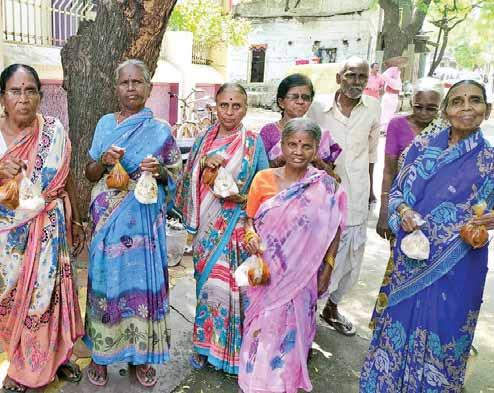
accepted,” says Jayesh Patel, project chairman.
To understand the depth and importance of this iconic project of the club, one of the largest in Maharashtra, here is a brief recap. The project is in its 13 th year and completed its 12 th anniversary on August 4, 2019. On that occasion, I visited the club and learnt from the committee which has been nurturing this project over such long years that during those 12 years, the Rotarians of this club hadn’t missed a
The project is in its 13th year and completed its 12th anniversary on August 4, 2019.
single day in delivering hot meals to its 100 senior citizens, come rain, shine, curfew or even hospitalisation of any of the beneficiaries.
The Rotarians spelt out for me the numbers and they are truly mindboggling — till that day, a single club had delivered over 4,380 days (or 12 years) 438,000 tiffins, without missing a single day, spending `1.44 crore. And all this money had been raised by RC Solapur, with generous contributions from the community in the city and beyond.
But the challenges and hurdles they encountered over the years seem smaller compared to the grim reality of today. Most of the 100 people this project serves have no family and live alone. As the country was veering towards a total lockdown, the Rotarians realised that if they wouldn’t be
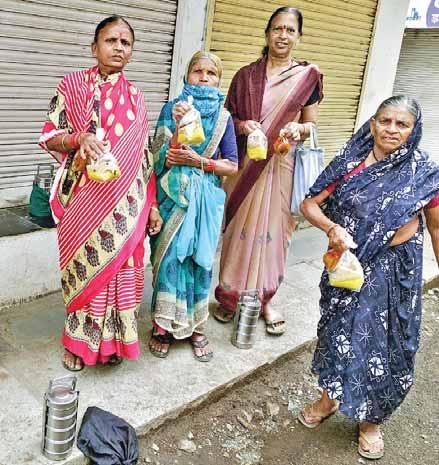
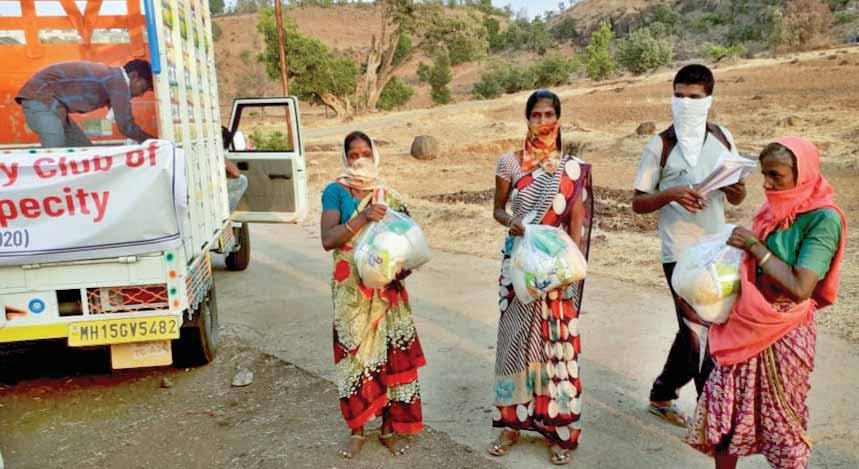
able to reach the daily meal to the senior citizens, they would probably starve.
Even when the day curfew of March 22 was announced a couple of days earlier, these good Samaritans got to work. “We got ready for them extra theplas the earlier evening so that they could get some nutrition,” says Patel, adding, “and on occasion of Gudi Padwa, we added a special seera (kesari) to their meal!”
Even though their dedicated auto rickshaw driver Jagdish Hiremath, This year 250 people have each pledged `8,100, the amount required to supply cooked meal for a year to one person.
who delivers the tiffins to these people, is willing to continue doing so, “we are also thinking of his safety. So for those who have some provision and ability to cook at home, we are organising provisions and grocery,” adds Patel.
Also, he is happy to announce that this year’s club president, Balaprasad Nundada, has been able to raise a record collection for Annapurna... 250 people have each pledged `8,100, the amount required to supply a cooked meal for a year to one person.
RC Nasik Grapecity helps a remote village
Elsewhere in Maharashtra too, Rotarians are adding their mite to help their fellow citizens cope with current difficulties. Rotarians from RC Nasik Grapecity, RID 3030, have reached out to the villagers of a remote village in Trimbak Taluka of Nasik District, by reaching 87 grocery kits to the families living here. “This village is 48 km away from the main city and was lacking in many basic amenities,”
says Rajan Pillai, Club President. The village had no access to clean drinking water, its primary school was in a pitiable condition and healthcare facilities were lacking. “Looking at these conditions, we have decided to adopt this village for three years, provide the villagers medical facilities, put up piped water supply and a storage tank, improve the school, extend micro credit to young women to start a vegetable or some other shop, and construct a check dam so that the farmers have access to enough water to have a second crop,” he says.
Club Secretary Anil Deshmukh adds that they are planning to upgrade the school by adding one more classroom and build a toilet. We want to do this before the onset of the monsoon and all our 53 members are committed to this task,” he adds.
But meanwhile, when the corona virus tragedy struck, the members came together to ensure that the villagers get their supply of essential items to keep their kitchen running.

Ni hao, Rotarians!
Every year, as we near the end of the Rotary year, we look back on the path we’ve travelled. Of course, this year has presented special challenges as we face a global coronavirus pandemic that has changed our lives and the way we do service. The great philosopher Zhuangzi once said, “A path is made by walking on it.” Only by forging ahead into the unknown do we actually make progress, and only by looking back can we see how far we’ve come. The coronavirus crisis is an unprecedented event, and I want us to look back years from now, knowing that we played a decisive role in helping the world overcome this devastating threat.
I am proud of the work that Rotary members and our Foundation are carrying out to stop the spread of COVID19 and to help people affected. Taiwanese clubs have donated 200,000 face masks. In England, the Rotary Club of Maidenhead Bridge launched a COVID-19 Volunteer Community Response Team to help those in self-isolation by shopping, dropping off prescriptions, and supporting those in need.
The Foundation Trustees worked quickly to add COVID-19 projects to their list of eligible activities for
Tdisaster response grants, transfer $3 million to our Disaster Response Fund for COVID-19 grants, and waive the 30 percent foreign financing requirement for any new global grant that addresses COVID-19.
Of course, we have applied the knowledge and resources we have built over many years in fighting another infectious disease: polio. The polio eradication programme is already using its infrastructure to protect the vulnerable from COVID-19, especially in polio-endemic countries.
Please give what you can to help our Foundation, and our members will transform your gift into humanitarian efforts that are saving lives.
We will overcome this virus together, and when we do, we will be able to look back and know that we did not stand by and do nothing when a global public health emergency paralysed the world. Instead, we took action and gave all that we could to stop this virus and make lasting change in our communities to help people survive and recover. Thank you for your past, present, and future support of our Foundation.
Gary C K Huang Foundation Trustee Chair
o help respond to the global COVID-19 crisis, The Rotary Foundation is offering several options that Rotarians can use to help care for and protect people in their own communities and others around the world.
The Rotary Foundation supports disaster relief and recovery efforts through grants from the Rotary Disaster Response Fund.
What does the Rotary disaster response grants support Districts that have been affected by natural disasters can use Rotary disaster response grants to launch their own projects or work with established
relief organisations to help their communities recover. Grant funds can be used to provide basic items such as water, food, medicine, and clothing. Grant funds can also be used to support COVID-19 activities. Districts should work closely with local officials and groups to ensure that the funding will meet a specific community need.
Who can apply for a disaster response grant
Once qualified for Rotary grants, districts in an affected area or country may apply for a maximum grant of $25,000, based on the availability of funds. A district may apply for subsequent grants after it successfully
reports outcomes from previous grants. Districts may receive no more than one disaster response grant to support COVID-19 activities.
The district governor and district Rotary Foundation chair must complete the Rotary Disaster Response Grant Application and send it to grants@rotary.org.
For more information, visit https://my.rotary.org/en/ take-action/apply-grants/ rotary-disaster-response-grants © rotary.org
Rasheeda Bhagat
He had worked extremely hard for a couple of years to raise money from his charity, his Rotary club (RC Box Hill Central in Melbourne), his Rotary district (RID 9810) and The Rotary Foundation as well as RC Nashik Road (RID 3030) to build 15 toilets in a school in Nashik. The toilets were inaugurated in 2015 with great fanfare and to the delight of the 500 students of the government school. But three days later, just as Mark Balla, the incoming president of his club, was in Goa preparing to attend a Rotary conference, he got a call from the school principal with the dreaded words: “I’ve got a problem.”
The hair on the back of his neck bristled; he was certainly not anticipating a “problem so soon as we had done something wonderful for that school which did not have a single toilet till then.”
The principal went on to say that the boys are now complaining; “and I said but why, we’ve built toilets not only for the girl students but the boys too.”
Imagine his happiness when Balla heard the principal say the boys were
complaining because the queues for drinking water had got longer because the girls had started drinking water too!
It is the same old story… girls, in a school in India without a toilet, not drinking water because they could not go out into the open as boys could. And the man, who subsequently went on to write a book titled The Toilet Warrior, and who has actually become one, had waged a battle to get the toilets built in this school because adolescent girls were dropping out of school for lack of toilets. And the younger ones were not drinking water in that school, so they would not need to use one during school hours!
But what about the boys, I ask, as we chat at the Rotary News Trust office when Balla was in Chennai a few months ago. “Well, for urinating, they use a wall, or a tree… boys are pretty disgusting, what can I say,” he grins!
An emotional Balla concluded the call with the principal, saying: “Please bring me more such problems; we will deal with this one.” The school would subsequently get more beautification, better drinking water facilities, etc. But to understand

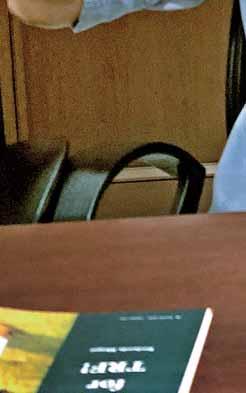

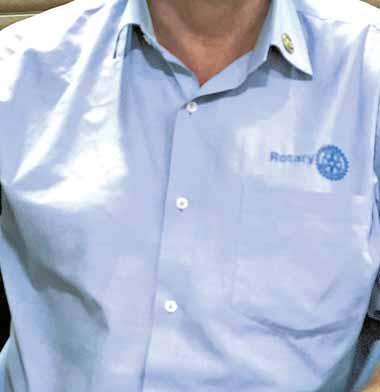

this Australian Indophile’s passion for India, let’s go to the beginning, sometime in 2012.
On board of an Indo-Australian joint venture with a factory in Kolkata, he’d come quite often to India for board meetings, some of which were held in Mumbai. One free Sunday afternoon in Mumbai, he took a local train and his life changed forever. On that journey, he started chatting with two young men, who happened to be from Dharavi, Asia’s largest slum. “Fahim and Tausif were both students of the University of Mumbai, and subsequently became close friends. They invited me to visit their community; they still live there. I told them once you get a good job, you can leave the slum. And they said: ‘But we don’t want to leave the slum. It is our home, our community.’”
Even though initially a little nervous, he took a leap of faith and visited Dharavi the next morning, and spent a few hours there watching how the people live, work and thrive there. “I found it to be an extraordinary place, and I have fallen in love with Dharavi now; every time I go to Mumbai I visit Dharavi,” smiles Balla.
Right at the end of that first visit, the two youngsters took him to a school, where he saw to his
Rotary has so much more to learn about sustainability; we’re trying.
But Rotary is still very good at giving things to people. But when you only give away things, you do not empower people.
astonishment that there were “boys of all ages but only little girls; there were no teenage girls, so I asked what is going on here. And I was told that they all dropped out because there are no toilets. This was like a brick hitting me in the head. Coming from Australia, it was like

somebody saying I have a house but it has no walls or a roof.”
He also found that the few adolescent girls who stay on, don’t drink water during the day, and during their menstrual periods, skip school altogether.
“Which meant that effectively they were losing 25
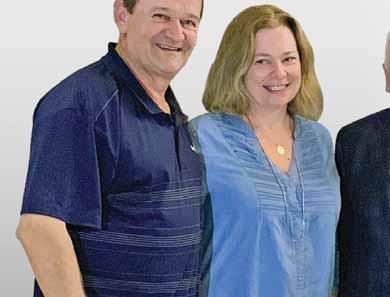
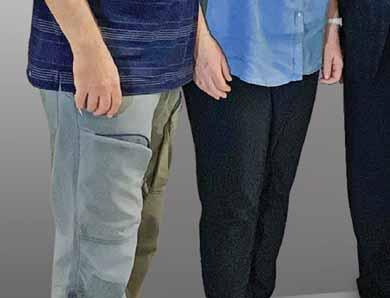
per cent of their education,” he says.
Remember, this was 2012 and the Swachh Bharat initiative had not yet started and it was the same story in several cities

and villages of India. In Australia he started talking to people about this to raise awareness, even while he continued coming to India. Soon their factory in Kolkata faced some trade union problems for which he contacted a consultant from Nashik, who happened to be Firdaus Kapadia, a Rotarian from RC Nashik Road. “I shared my astonishment about a school without toilets in Mumbai during small talk with him, and he said this was a common problem and his Rotary club had a relationship with such a school in Nashik.”

At that point Bhalla had a very fuzzy idea about Rotary… “to me, Rotary in Australia was old men cooking sausages outside a shopping centre! I had no idea they did community service.” Kapadia told him his club had trained teachers and provided a library in a school which also needed toilets. Balla responded saying he had collected a few thousand Australian dollars from his small charity in Australia called We can’t wait, offered this to the Rotarian who said it “is a good beginning, but not enough. My club and district can put some more money but we need more, as we have to build 15 toilets because that one school has 500 kids.”

Kapadia suggested Balla approach some Rotary clubs in Australia

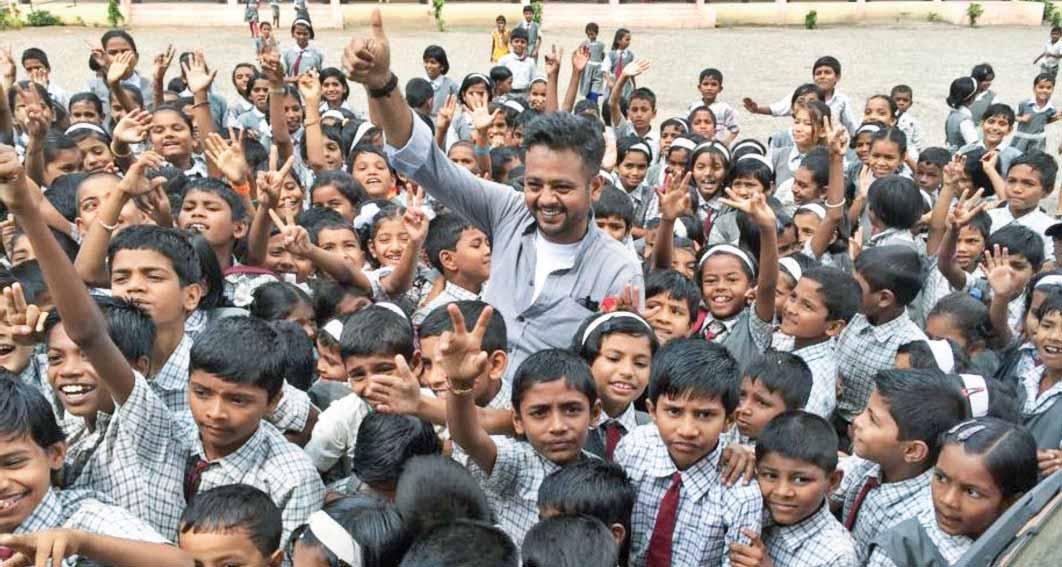
and ask them if they’d like to support this project. The Australian spoke to a couple of Rotary clubs about his Indian experience, how his charity had raised some money, etc and some members of RC Box Hill Central said: “Wonderful; why don’t you join our club and let’s work on this together. I joined the club and within months we were applying for district grants and I was back in India later the same year to start the project.”
The first of the 15 toilets was inaugurated in March 2015 in the Nashik school.
Asked about the school in Dharavi, Balla says regretfully that he has not
A TRF audio showed great results; a noticeable reduction in the absentee days of adolescent girls, an increase in their enrolment, some from nearby schools which didn’t have toilets.
managed to help build toilets in that school. “It is difficult to work in a slum, space is a huge issue and getting permits is almost impossible. Permits are anyway a disaster.”
Returning to the Nashik school, Bhalla says the day the 15 toilets were inaugurated was “one of the best days of my life. It was a very emotional day.”
In all about $12,000 was raised by all the
parties concerned; “it was a small project, but for me, coming from outside Rotary, this was a miracle.”
For the inaugural some Australian Rotarians came to Nashik and “we had lots of selfies, signing of autographs, and of course cricket… there were 80 Indians in the slips and two Australians and we lost very quickly! They killed us!”
Bhalla returned to Australia, told his club members about the 15 toilets and “we knew we had got something special. So I went back to the Nashik club and said let’s do more; and we started doing global grants, which covered 5,000 children and seven schools.”
After the grants were executed and TRF did an audit, “we got some
great results. There was a noticeable reduction in the absentee days of adolescent girls and also an increase in enrolment of adolescent girls, some of them from nearby schools which didn’t have toilets. Incredibly, teenaged girls were actually returning to the education system.”
This was 2015; by now Balla had become a blue-blooded Rotarian and attended the Sao Paolo Convention where he addressed a WASRAG (Water and Sanitation Rotary Action Group) session and met PRID Sushil Gupta, who introduced him to PDGs Ramesh Aggarwal and Sharat Jain. “That was the beginning
of another good conversation and project. We met in Delhi and decided to do three global grants.”
The focus this time was to bring about a strong behaviour change and the Rotarians forged a strong partnership with World Vision to implement a twoyear project in 11 schools. Its volunteers would go every week to the schools, and in January 2019, at one inaugural event “someone senior from the North Delhi Municipal Corporation was present. He said I’ve been watching this for two years, Rotary is such a serious community-based organisation and we love what you have done with these kids and we are going to copy it. But we will copy in 700 schools and reach 350,000 kids.”
Adds an exhilarated Balla: “This is the power of the Government and the
power of Rotary… that we can have such an influence in our community.”
That project was in the planning and might have been put on hold thanks to the corona pandemic during which all of GoI’s energy and resources are diverted to dealing with this unprecedented crisis.
“But the story here is the commitment and recognition of the good work of Rotary. It is so important for us to know that we can influence others.”
Even as the mega Delhi project was being executed, he started another project with PDG Ramesh Aggarwal’s club (RC Delhi Asoka), for which a third global grant for $254,000 was approved. The money has come from 25 clubs, six Rotary districts and seven countries, including the US, Australia, India, UK, New Zealand, DDF
At that point (2012), for me, Rotary in Australia was old men cooking sausages outside a shopping centre!
I had no idea they did community service.
from several RI districts and even RC Chicago. This project for 19 schools involves building new toilets, repairing some old ones, beautification work, etc. “But the focus on 70 per cent of this project is on behaviour change as that is the most difficult bit,” he says.
Meanwhile Balla has forged partnerships to have small projects continuing in Nashik, Pune and even Ethiopia and began consultations for people working in Cambodia, Solomon Islands etc. He joined the
board of WASRAG and is now its Vice Chair and also technical advisor to TRF’s Cadre working in WinS Target Challenge and was sent to Guatemala last year to do an assessment of the work being done there in this area.
How does Guatemala compare with India in implementing WinS and other projects, I ask him. Balla is candid in his response: “India has more opportunities to improve things and that is what makes working in India so exciting… it is much harder in poorer countries.”
So how important was sustainability in the projects he has worked with in India?
Balla admits that “Rotary has so much more

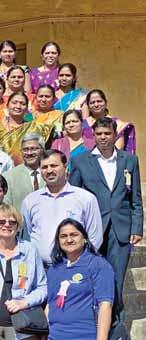
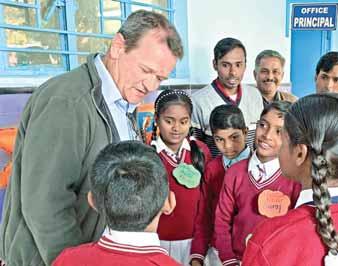

to learn about sustainability. We are not yet good at it; we are trying. But Rotary is still very good at giving things to people. But when you only give away things, you do not empower people. We need to do that.”
Asked if the schools they built earlier have adequate water supply, Balla says that in those days sustainability was not the mantra. “But we have now decided we will not work with schools which do not have easy access to water. I don’t want to work with schools unless the headmaster is extremely keen for help. We now have a school project in Nashik which is going to be spectacular; it will probably become the first school in the world to get a three-star rating.”
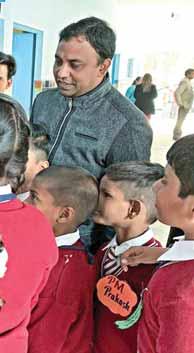
The ultimate objective, adds Balla, is to use the school and transform the community “to the point they feel they can no longer live without a toilet at home. This is deep transformational thinking that we’re talking about.”
Of course TRF has now started emphasising on sustainability; “and we are learning.” He attended a Sanitation Economy summit in Pune,
When I learnt there were no toilets in that school it was like a brick hitting me in the head. It was like somebody saying in Australia that I have a house but it has no walls or a roof.
wants to reach a million kids, and this can happen thanks to Rotary really connecting the world. He gives the example of a club he had addressed in the US through a video conference, and about six months later got a call from “them saying we really liked what you are doing in India and we are going to copy it in Guatemala. But that’s not really what I am calling you about.”
a non-Rotary event which was very interesting, “and was mostly about supporting young vibrant social entrepreneurs and Rotary needs to become a serious player in helping them thrive. We have an opportunity here; we need to understand that with our average age, particularly in the west, we don’t have the vibrancy of a 23-year old social entrepreneur who is willing to take crazy risks. But these guys need help.”
If you take Balla’s India scorecard, he began with 500 kids and about $2,000, if the corona pandemic had not come, by March 2020, he would have helped raise a million Australian dollars for projects in India and touched the lives of 100,000 kids.
Ask him about his dream and he says he
He was calling to tell Balla about sitting next to a Rotarian from another part of US; he shared the India story and later got a call from that Rotarian saying they were going to replicate the school project in Honduras. Balla who has now sold his business and is involved full time in voluntary work says, “This is the best job I’ve ever done in my life. These are the stories we hear; who knows how many more are out there. This is the magic of Rotary.”
He has put down his experience in building toilets in Indian school in a book titled Toilet Warrior which is priced at `500. He says the profit from the book — he expects around $30,000 — will go to TRF.
The book, published by Notion Press, Chennai, is available at https:// notionpress.com/read/ toilet-warrior
Designed by Krishnapratheesh
Union Health
Minister Harsh Vardhan, on a web conference with senior Rotary leaders and Rotarians across the country, thanked Rotary for the commendable work they have done across India in providing relief to people hit hard by the corona pandemic.
“You have collected `26 crore for the PM CARES Fund and your other contributions such as provision of critical hospital equipment, sanitisers, cooked meals and foodgrain packets, etc, totalling `75 crore, is really praiseworthy,” he said.
The minister explained in detail the alacrity and the war-footing on which the GoI, led by Prime Minister Narendra Modi, and various high-power committees set about the task of controlling the corona pandemic. A group of Ministers (Health, Aviation, Shipping, Home Affairs, External Affairs), headed by Vardhan as the Health Minister, had met
by mid-April as many as 12 times since Feb 3.
Eleven Empowered Groups headed by Secretaries/ Member, NITI Aayog, were set up to review the situation.
Under his leadership, a high-level committee of experts was set up, and regular video conferences were held with Health Secretaries of all States and relevant Central Ministries as early as Jan 27, he added.
He was also in touch with both the chief ministers and health ministers of various States, and also made a round of the Delhi airport, quarantine centres, hospitals to check field level implementation.
Harsh Vardhan reiterated that the GoI was quick enough to respond as early as Jan 8, even though WHO declared COVID-19 as a pandemic only on Jan 30. The States were asked by the Centre
to initiate “health sector preparedness on Jan 17; the point of entry surveillance was initiated from Jan 17, 2020, itself at all airports. We have been pro-active, pre-emptive and maintained inter-ministerial coordination as key focus areas,” he said.
As part of the huge preparations to deal with this pandemic, airport and port staff were trained, hospitals for treating those infected were identified, traditional and social media were involved in disseminating safety messages,
precautions to take, maintaining social distancing and who to contact where symptoms were seen. Special training sessions were held on the usage of ventilators.
“Even though we have ordered 55,000 more ventilators, I would like to tell you that less than one per cent of the infected persons need to be put on ventilators,” said the Minister.
Air, ship and land borders were quickly sealed, all their staff adequately trained to screen arrivals, Quarantine Medical Teams oriented on patient management and infection prevention and control. Dedicated Central teams inspected all airports, ports, etc from Jan 25.
The government also acted speedily in suspending all existing visas, except for certain essential groups, till April 15 and Visa-free facility to Overseas Citizens of India (OCI) was also suspended.


Community surveillance and health monitoring was done, advisories issued regularly to States, and testing strategies were put in place and by April 21, 4.38 lakh people had been tested.
Returning to the timely service and assistance rendered by Rotarians, the Minister added, “Your service rendered in eradicating polio cannot be described in words, and that too at a time when there was skepticism around the world and even India on covering every child under polio immunisation.”
The result of the work done by Rotarians in polio immunisation was that “we haven’t seen a single case of polio in the last nine years,” he added.
Briefing Harsh Vardhan on the work done by Indian Rotarians, RIPN
Shekhar Mehta said that under the leadership of RI Directors Bharat Pandya and Kamal Sanghvi, and the district governors, Rotarians in India had, till April 20, distributed medical equipment worth over `30 crore, 2 lakh sanitisers, 75,000 units of PPEs, over 25 lakh meals, over 3,500 hours of mental health counseling, and the female skill development workers trained by Rotary were preparing thousands of masks.
have, and till now 180 districts worldwide have been given $25,000 each; the total comes to nearly `24 crore. In India 21 districts have been given this grant, and the total value is `4 crore.
Of the bigger grants or GGs, till now 11 GGs worth `7 crore have been sanctioned for donating ventilators and other equipment to hospitals.
provided by Vardhan in fighting the corona pandemic; “we are fortunate that at a difficult time like this you are our Health Minister.”
RMehta urged Harsh Vardhan to get Prime Minister Modi for just 5 minutes for one such webcast and “I am certain this would convert the `101 crore of Rotary India’s contribution to COVID-19 relief to `125 crore in no time.”


“We wanted to raise `25 crore for PM CARES Fund, but already `26 crore has been raised, and Rotary India had done COVIDrelief work worth `75 crore, which took the total (by April 21) to over `101 crore. He urged the Minister to keep in mind that all this had been done “by Rotarians by dipping into our own savings. For a corporate it might be easy to donate `500 crore... hats off to them of course for doing that, but also hats off to Indian Rotarians for doing all this by reaching into their own pockets.”
TRF Trustee Gulam Vahanvaty said that TRF “has specially instituted a Disaster Response Grant to assist projects associated with relief work for disasters and right now there is no bigger disaster than the corona pandemic that the world is facing.” So the Trustees have decided that TRF should assist each one of the 540 districts that we
“Our vision for the next five years on the healthcare front is setting up 50 eye hospitals, 40 blood banks, 50 mobile clinics for mammography, eye testing/ treatment, doing 25,000 paediatric heart surgeries, and health check up of 15 lakh people every year. All this work Rotarians would like to do with the Health Ministry under your leadership. You have worked with us before in Polio…. the bonhomie we have with the government in PolioPlus began only with you, and you are one of the biggest supporters of Rotary. I know the passion you have on these issues and we Rotarians share a similar passion,” he added.
PRIP Rajendra Saboo praised the leadership
I Director Bharat Pandya complimented the Minister for his “exemplary leadership” and said the Rotarians in India were with him in their belief that the most important asset a human being can have is “good health” and were engaged in a plethora of activities to help the government in tackling this pandemic, including a sizable contribution to the PM CARES Fund. He promised that as it has done over the years in getting India rid of polio, Rotarians will work shoulder to shoulder with the government during this pandemic too. “And once this crisis is behind us we will work with the GoI on other areas related to health, particularly in non-communicable diseases and look forward to your guidance and support.”
RI Director Kamal Sanghvi thanked the Health Minister for his time and encouragement, and all the Rotary leaders and Rotarians across the country for their generosity and hard work during a difficult time.
PDG Ranjan Dhingra welcomed the gathering.
In a Zoom meeting convened by RIPN Shekhar Mehta with Prakash Javadekar, Minister of Environment, Forest and Climate Change, and Information and Broadcasting, over 300 Rotarians discussed issues ranging from literacy, environment and the COVID pandemic.
Mehta requested Javadekar to organise a five-minute virtual meeting with PM Modi. “We have surpassed our target of ` 25 crore for the PM CARES Fund for COVID-19 relief. Rotarians have contributed `30 crore so far; and it will enthuse us more if we can symbolically hand over the cheque to him over a Zoom meet,” he said.
He spoke about Rotary India’s environment mission in which “30 crore saplings will be planted in the next five years and one lakh solar lamps installed in many villages.” He apprised the Minister of Rotary’s response to the pandemic. Rotary clubs have distributed over one crore masks, 75,000 PPEs, two lakh litres of sanitisers, over 25 lakh meals, `20 crore worth medical equipment and women trained at Rotary’s vocational centres are stitching masks
for various regions. “The total value of our work is ` 75 crore and still counting.”
He reiterated that Rotary will implement 10 per cent of government’s projects in the next five years and ` 200 crore worth humanitarian projects in the country to commemorate Rotary India’s centennial.
In a lighter vein, he pointed out how the government has taken care of the entertainment quotient of people during the lockdown. “The telecast of Ramayan and Mahabharat is a great move. My mother watches these
serials for at least five hours every day,” said Mehta.
New normal Javadekar in his address pointed out that video conferencing, masks, sanitisers and frequent hand washing are the new normal. “This is how we have to meet in the coming days until a vaccine is discovered to protect people against the corona virus”. In his 40-year association with Rotary, he had participated in Rotaract programmes during his college days, he said.
Adult literacy is close to his heart, the Minister said. “My mother was a primary school teacher and during an adult literacy campaign in a village, accompanying her when I was 10, I remember telling her that I will teach the older men while she teaches the women. And I enjoyed doing that.” He praised RILM’s syllabus designed for Adult Literacy, and said he had recommended it to the NCERT board.
The Minister gave an account of India’s progress in managing the corona pandemic. “The Make in India concept is more pronounced now. We are making our own masks and PPEs. We have started implementing in three months what we could not do in

70 years. We are exporting hydroxychloroquine, the COVID-fighting drug to the world. I see a new India emerging where our people return to their roots and participate in our development. This pandemic has taught us several lessons and given us opportunities to grow,” he said.
A Q&A session was moderated by RI Director Bharat Pandya.
PRIP Rajendra Saboo asked the Minister how the government was planning to keep the country clean after the lockdown is lifted, especially “when I see rivers like the Ganga flowing so clean”.
In a lighter vein, Javadekar urged Saboo not to “become over-romantic. During the lockdown, work has come to a standstill everywhere. But it cannot remain so for long. You want to live in a big town, have more facilities, factories etc. But you don’t want pollution. You cannot have the cake and eat it too. We can only minimise pollution and not fully stop it.”
PRIP Kalyan Banerjee suggested that behavioural change towards environment be introduced as a subject
I see a new India emerging where our people return to their roots and participate in our development.
in schools and colleges. Javadekar welcomed the idea and suggested launching a smart campus campaign and recognising colleges excelling in areas such as cleanliness, greenery, electricity saving/generating, water treatment and waste management.
Air and water pollution and tackling climate change are this government’s primary focus areas, Javadekar said, replying to a poser from PDG Kamlesh Raheja, Rotary’s Environment Committee Co-chair.
Director Pandya asked why the ban on single use plastics is not as effective as it should be.
The Minister replied that banning of plastics is not the solution. A system
should be in place to collect and recycle plastic waste. Cement and other industries are using multi-layer plastics. Thermocol and single use plastics such as sachets, straws and cups should be banned; it is not easy to collect this waste. They cause harm to the environment.
To another question on whether the government can earmark some barren lands across the country for Rotary to create mini-forests, he said that a National Forest Policy is being planned for a private-public partnership. Presently, India is importing `40,000 crore worth wood, and Indian industrialists own forests abroad. “The concept is not attractive here because cutting trees is banned. The new policy will address this drawback,” said Javadekar.
In his welcome address, RI Director Kamal Sanghvi said, “You have been a guiding force when we launched our literacy programme and we want you to be with us now as we focus on environmental programmes.”
RIDN Ravi Vadlamani delivered the vote of thanks.

Aweek before the COVID19 lockdown, Rotarians of RID 3060 got their act together to ensure that the eight Rotary Youth Exchange programme students in their district reached home safely. “We wanted them to be back with their families,” says Nehal Shah, District IYE Co-chair and member of RC Surat. Everyone except Heloise, an exchange student from France, is back home safe. “We could not send her back because the lockdown was imposed a couple of days before her scheduled flight.”
Heloise’s home club, RC Dijon Toison, RID
I enjoy making Chakri (a Gujarati snack) and practise Bharatanatyam.
Heloise an Exchange student hosted by RC Surat
Kiran Zehra
1750, decided to let her remain in India. She is hosted by RC Baroda Sayajinagari. Her host parents Mayal Bhayani and Vaishali were initially worried about how she would take the news of the lockdown but were amazed that “this child displayed such courage and confidence,” says Mayal Bhayani. His wife Vaishali adds, “We are bonding so well.”
The French girl was a little anxious when her team members headed back home at a time when the number of infections in her hometown was increasing. “I learnt that one of my classmates back home was infected with the virus, and realised that staying indoors was the best way to fight it. My host parents are making me feel comfortable in every way.” The 16-yearold is learning to cook Indian cuisine. “I enjoy making Chakri (a Gujarati snack) and practise Bharatanatyam. I learnt the dance from my first host parent Charmi Shah.”
A member of RC Baroda Metro distributing meal packets to a family.

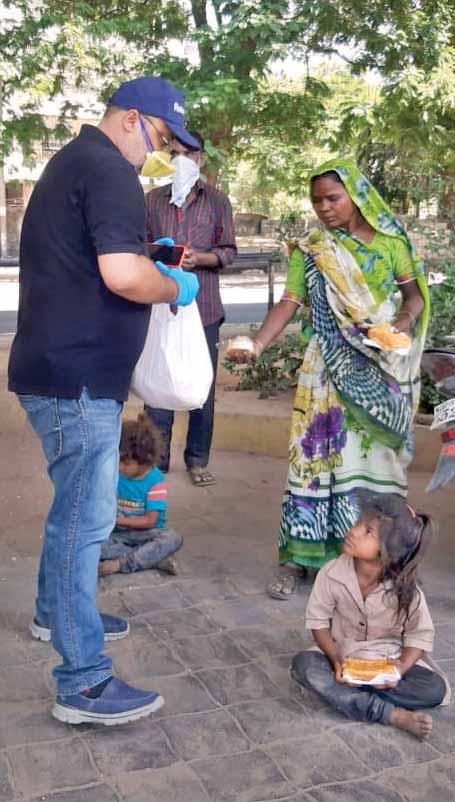
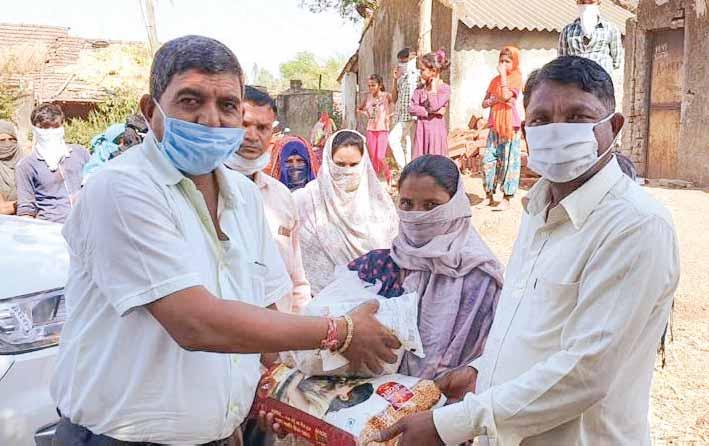
Three Rotary clubs take care of more than a lakh migrant workers in a region known for manufacturing yarn and polishing diamonds.
She is in touch with her family and batchmates through social media and hopes to reach home safely “after my exchange term in India that ends in June 2020.”
Rotary clubs in RID 3060 have joined the fight against the COVID-19 pandemic. PRIP Kalyan Banarjee’s club RC Vapi raised `334,000 to supply 200 food packets every day, throughout the lockdown. At the request of the District Collector, the club’s Rotary Haria Hospital provided 500 units of hand sanitisers
to the Valsad District Administration.
Within the first two weeks of the lockdown club members Munna Shah, Kirit Mehta, AK Shah, Ashraf Nathani and GL Modi donated a total of `95 lakh to the PM CARES Fund, while Mahendra Shah donated `2.25 lakh to the CM Relief Fund.
Over 500 food packets were distributed to migrant workers struggling to return home. The club will be distributing kits containing food grains
police personnel. Safety kits were provided to the medical and paramedical staff of the Baroda Medical Union. Club member Vrajesh Amrit, a hotelier, has been distributing 800 food packets in three slum areas in Vadodara.
and essentials to the needy till the end of the lockdown,” says RJ Singh, the club president.
RC Baroda Metro distributed food packets to 300 migrant labourers and masks and snacks kits were provided to
RC Surat Seaface provided food worth `5 lakh to 4,000 underprivileged families. RC Surat gave 6,000 food packets and safety material worth Rs 10 lakh to the needy. RC Udhna distributed 2,800 food and safety kits worth `23.75 lakh to 11,200 beneficiaries. These three clubs have carried out distribution in a region known for manufacturing yarn and polishing diamonds where more than a lakh labourers

Masks being stitched at the Rotary Women’s Empowerment Centre of RC Ankleshwar.


Kakshala is a tribal village in Dang district with about 700 families scattered across a dense forest. During the initial days of the lockdown, Nikhil Madrasi, President of RC Surat, RID 3060, received a call from the District Forest Officer saying “the villagers were suffering from hunger and requested us to provide them some grocery. We are already associated with the village and go there regularly to distribute clothes, books and stationery for schoolchildren.”




where the tribal people had assembled. “We were amazed to see their discipline — maintaining physical distance and using cloth masks to cover their nose and mouth. Their gratitude and relief were worth the ride,” says Gandhi. Each bag had 5 kg of atta and rice, 1 litre oil, spices, 2 kg potatoes and onions, tomatoes and other vegetables, enough to last for a fortnight for a family of four.
Around 3,000–3,500 food packets are distributed every day to sweepers, street-dwellers and other lower income families. We also distribute grocery kits to some families so that they can cook food to their taste,” says Madrasi.


“The lockdown is now relaxed in the village as there is no COVID cases there and life is back to nor-


The club members swung into action and arranged a tempo-load of groceries and vegetables for the villagers.
Two members — Chirag Gandhi and Ketan Patel — then set out on a 135-km drive to the village after getting necessary permissions.

wung into mpo-load es for the ag Gandhi set out on lage after ons.
mal for the tribals now,” says Club President Madrasi.
The club also runs a food and medical helpline and takes requests from the elderly and sick, who do not have access to help, and do home delivery of medicines, groceries and vegetables, he says. Two Rotarian doctors offer consultancy services over phone and have the medicines delivered at the patients’ home. More recently, the club has introduced spectacle repair services. “We pick up broken/faulty spectacles, get them mended and deliver them,” says Gandhi, past president of the club, a former Rotaractor and an avid biker.

l l i te e ra te v en n h av e noot t avai a l
The villagers are illiterate. Some of them do not even have ration cards and so could not avail the free ration given by the government. With no industries in the vicinity, they are engaged in a little farming and cattle grazing for their livelihood.
G a n d h i h a d p os te d a vi d de o of this visit on YouTube and was fl oo de d wi t h c a ll s a n d o ff er s to help In no time he had `1 lakh h in his kitty, with fr f iends s and d relativeves pitchi h ng n in. “This is being g ussed d to feed the hun u gry in n Surat noww,” , he e says.

The Rotarians drove through a rugged, muddy path to reach the village on the Gujarat-Maharashtra border. At least now there is a tar road up to an extent; it has been laid recently, says Gandhi, adding that the nearest petrol bunk is 40 km away, and the market area is 25 km far. “The villagers have to cross over a hillock by foot to access the nearest civilisation. Life is very tough for them here.”


Th T e cl l ub u m em m be b rs , 2 25 of f them, along with h their r sppouses, are e still l re ac c hi h ng g o ut t o th h e homeleess and thhe e hun ugrry, y with h food od packets and wi w ll connti t nue e to t do o so unti t l the lockkdown is liftted e

Gandhi and Patel distributed the grocery kits in two locations
t he e g ovies in in a liittle g for the h ir a reach the ahhar a ashtra re e is s a taar r has been h hi, addding g unk is 40 0 ar a e ea is 25 e to cro o oss access the very tough i s tr i b ut ed lo ca ti on o s
On s ou rc in n g th e fo od o M ad ra r a si i s sa s ys thaat t “wwe e assk k fo r ju st f iv e ro o ti t s fr from o each ho h usse e in th t e resi s deentntial soci cet t ie e s bu t ge g t 10 –2 2 0 roti tis We hav a e a ki kitctchehen in our ur Rot o arry y Haall and d ha a ve h ir ed d a c oo o o k to o t ma m ke the e suubzzi or r da d l.” ”

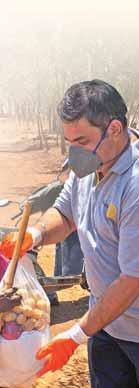

p ,y,,p aractor and Rota of the Ro Rtn Chirag Gandhi helping a tribal woman with some vegetables and groceries.




worked to earn a living but are now stranded.
RC Ankleshwar has so far distributed 40,000 food packets and 300 litres of hand sanitiser for the police, healthcare workers and general public. The club has also disinfected Jitali, Vataria and Dahej villages near Ankleshwar. With the permission of the local authorities, the club’s Rotary Women’s Empowerment Centre is making face masks to be distributed across the district. Club member Vipul Gajera has donated
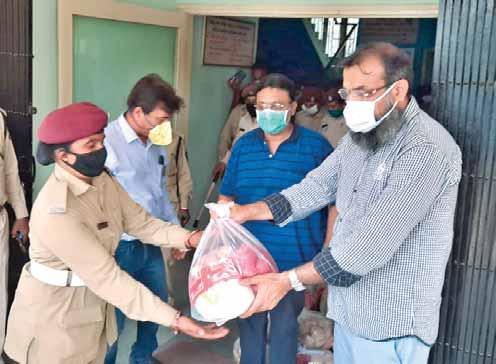

RC Surat runs a food and medical helpline and do home delivery of medicines, groceries and vegetables for the elderly and sick.
to slum dwellers, truck drivers and healthcare workers.
`10 lakh to the CM’s Relief Fund.
Dry ration kits worth `10 lakh were distributed by RC Bharuch to 2,000 daily wage workers. RCC Bharuch Femina and Bharuch Narmada Nagari with support from RCC Mangrol are continuously providing food kits to the poor in the region. Rotary clubs in Dondiacha and Dhule also gave sanitisers and masks
The Rotaractors have also pitched in to mitigate the effects of the lockdown on the poor. RAC Amreli, in association with local organisations and the police, is running a feeding van. RAC Vallabh Vidyanagar, along with RAC Chandigarh, RID 3080, is running an online COVID-19 awareness campaign.
“The restriction is on our feet, not pockets,” says DG Anish Shah who is constantly in touch with “my guiding force PRIP Banerjee, who has urged not just the Rotarians of my districts but every club in the country to give as much as we can in the name of Rotary.”
Having doctors as incoming or nominated district governors is certainly a boon during a pandemic such as the one the world is facing in COVID-19.
As the country shut down during the pandemic, as early as March 27, RID 3202 DG A Karthikeyan quickly
formed a taskforce to see what best the district’s Rotarians could do to help fight the spread of coronavirus. The very next day a meeting was held and a decision was taken to supply PPEs (Personal Protective Equipment) to the Calicut Government Medical College, masks, gloves and sanitisers to the police personnel, water to government servants working
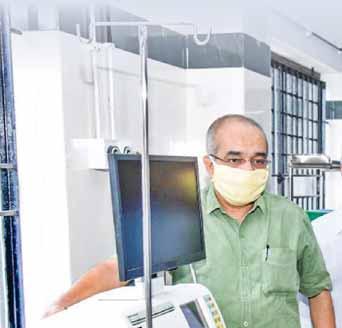
in corona control tasks, and medical equipment to a hospital.
DGN Dr Rajesh Subash put forth the idea of setting up an infectiousdiseases ICU at the Calicut Medical College which was readily accepted. A group of Rotarians visited the college on March 30; on April 9, got consent from the college Principal
DGN Dr Rajesh Subash (second from R) at the ICU in Calicut Medical College.





Kerala State Minister for Fisheries J Mercykutty Amma inaugurates distribution of food packets by handing over a packet to Abdul Nazar, District Collector of Kollam, in the presence of (from R) PDG John Daniel, Public Image Committee Chair R Vijayakumar, Meera Daniel, DG Shirish Kesavan, Kollam City Police Chief T Narayanan and DSG Alex Thomas.
Dr Rajendran to set up the Rotary ICU. “Our benefactor, Rtn Balakrishna Marar donated `5.5 lakh, and by April 15, the Rotary ICU for infectious diseases such as COVID, with 10 ICU beds, four ventilators and 50 other medical equipment, including 10 multipurpose monitors, five infusion pumps, five syringe pumps and one defibrillator was ready,” says Dr Subash.
The ventilators and 65 other equipment were acquired in record time and all the Rotary clubs of Calicut in District 3202 came together to fund this venture worth over `1 crore.
Incidentally, the Calicut Medical College Hospital is the largest in India going by bed strength; it has over 3,000 beds. Pending official inauguration of the Rotary ICU at a more convenient date, in order to serve the urgent need of tackling the corona pandemic, this ICU was opened by the local MLA Pradeep on April 20.
Among the States in India, Kerala is being appreciated not only within
the country, but around the world, for the speedy response of its government, aided by civil society (of which the State’s Rotarians form an integral part) in controlling the spread of corona.
ICU ventilators by RID 3211
RID 3211 responded to the corona pandemic under the leadership of DG Shirish Kesavan and DGE Dr Thomas Vavanikunnel by providing ICU ventilators to four medical colleges in the south of Kerala at a cost of `1.05 crore. “Ventilators are the need of the hour
and they will be in demand even after the COVID-19 pandemic is behind us. The medical colleges will maintain the ventilators ” said DG Kesavan, appealing to all the Rotarians in his district to donate liberally to TRF. This would enable global grants which have been tweaked by the Foundation to help corona relief work being done by Rotarians across the world.
RID 3211, comprising 4,600 Rotarians in 143 clubs in five Revenue districts of Kerala — Thiruvananthapuram, Kollam, Alleppey, Kottayam and Pathanamthitta — was also quick to act for other COVID-19 relief work.
venture worth over `1 crore.
DG Kesavan said that as Pathanamthitta and Thiruvananthapuram are among the eight districts in Kerala declared as COVID-19 hotspots by the Kerala government, the district’s Rotarians “have provided masks, hand sanitisers, gloves, PPEs, food grains, vegetables and groceries, cooked meals, beverages and drinking water worth crores of rupees all over
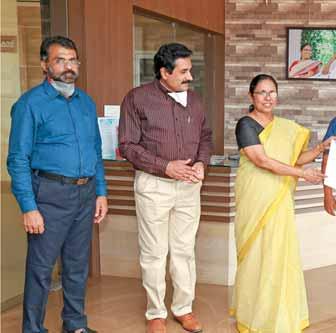


DG Shirish Kesavan, PDG John Daniel and PDG Suresh Mathew with Kerala Health Minister K K Shailaja. Also present: District Secretary General Alex Thomas, Additional DSG Vinod Gangadharan and PR Committee Chair L Jigeesh Narayanan.
the five revenue districts comprising RID 3211.”
As there was an acute shortage of ventilators, “in response to a specific request from our Health Minister K K Shailaja, the district is going to implement a global grant project worth $300,000 by providing ICU ventilators
to the Government Medical Colleges in Kollam, Thiruvananthapuram, Alleppey and the Government Hospital in Pathanamthitta.”
Another GG worth $70,250 for providing five ICU ventilators to the Government Medical College with Rotary Clubs of Pala, Kottayam Southern and Kottayam Central as Indian partners and RC SchwetzingenKurpfalz, as international partner, is already approved by TRF, he added.
duty, orphanages in Kollam City and the destitute on the streets, and supplied N90 and 3-layer masks and hand sanitisers to the police personnel on COVID-19 duty and healthcare providers, Kesavan said.
PDG Daniel added that his Foundation was also responsible for distributing 1,400 litres of sanitisers and 5,000 masks to the frontline warriors fighting this pandemic.
in Kollam, Thiruvananthapuram,
Add to this “the fabulous service worth `12.5 lakh rendered by ARRFC and PDG John Daniel and Meera through their family-led Y Daniel Foundation, which is the RCC of Rotary Club of Quilon Lotus.” They have been providing 650 meal packets every day for the initial 21-day lockdown beginning from March 25 to the police personnel on COVID-19
In terms of creating awareness about the new coronavirus and making people compliant, Rotarians have been in the forefront. Apart from Zoom meetings, clubs have been distributing pamphlets spreading awareness about the importance of quarantine, self-isolation, staying at home, use of masks, gloves and sanitisers and other safety measures to guard against the pandemic, he added.

The 2019–20 RI Board of Directors met via video conference in mid-March and April, and reviewed 10 committee reports and recorded 36 decisions.
The Board agreed to prioritise the health and safety of Rotarians during the COVID-19 outbreak and encouraged districts to follow local government recommendations for gatherings.
Districts can convene online their training events, including PETS and district training assembly, before June 30, 2020, at no
cost to RI, should there be government restrictions or if district leaders feel such action is appropriate. These meetings should be held as three one-hour programmes to cover Rotary’s strategic plan, role and responsibility of the participant, and goals for the year.
Districts can delay their district conferences until June 30, 2020 at no cost to RI, or cancel them, in adherence to government or district leader’s recommendations.
Following the cancellation of the RI Convention at Honolulu, the Board approved refunding of registration fees and fees for RI ticketed events to registrants. A free virtual convention will be organised from June 20–26.
Zone Institutes, regional leaders training seminars, governors’ official club visits and all such events are encouraged to be held virtually for the year 2020. Rotary Institute Conveners are authorised to decide whether to conduct such meetings in-person or virtually. But no Rotary staff shall attend an institute, or training programme in person unless specifically authorised by the general secretary.
No in-person meeting shall be mandatory for any Rotarian who may feel uncomfortable attending because of the pandemic.
No in-person meeting shall be mandatory for any Rotarian who may feel uncomfortable attending because of the pandemic.
All RI Board and Committee meetings shall be conducted virtually for the remainder of calendar year 2020. The 2021 International Assembly will be a virtual event if more than 40 per cent of DGEs are unable to attend in-person.
Directors shall not be funded to attend an institute that is outside their zone or region unless specifically authorised by the RI President. RI will not fund the expenses of any RI President’s representative to a district conference for the 2020–21 Rotary year. If a district requests an RIPR, the RI President may appoint one at no cost to RI.
The RI Board amended its policy to recognise exceptional Rotaractors with the Service Above Self Award, and the Avenues of Service Award, and for Rotaract clubs to be eligible to receive the Significant Service Award.
The Board agreed to sunset the Rotary Global Rewards programme by July 1, 2021.
During the corona pandemic lockdown, the Rotary clubs of RID 3190 rose to the challenge to help the people of Karnataka in various ways. As of May 4, the district had raised `1.1 crore as donations, distributed 6.7 lakh meals, 15 lakh kg foodgrains, `35 lakh worth medical equipment, and 1.3 lakh medical items. Video capsules of the activities of Rotary clubs were circulated across the district.
Members of RC Bangalore West, along with Goldman Sachs, provided grocery kits to 15,000 migrant families stranded in Marathahalli, Varthur and Madiwala localities. “We distributed 225 tonnes of food grains, costing `1.06
crore, in 10 days,” said club member, PDG Rajendra Rai. Each bag had 10 kg rice, dal, cooking oil, spices, wheat flour and other essential items. The club, along with RC Bangalore Junction, provided 1,000 coronavirus testing kits worth `11 lakh to the Rangadore Memorial Hospital to enable free screening, which otherwise costs `4,500, for underprivileged people.
Around 10,000 pamphlets were distributed to spread awareness about the virus and importance of following precautions, giving details of the availability of free testing facilities.

RC Indiranagar partnered with XLRI Alumni Group and Global SME Hub to distribute 70,000 grocery kits
worth ` 6.5 lakh, and launched six crowd funding campaigns to provide PPE kits to doctors and medical staff and more ration kits. The club contributed `20 lakh to the PM CARES Fund, with one member, Ghanshyam Agarwal, donating ` 15 lakh. “In March when the pandemic began, he became an AKS member by giving `1.04 crore to TRF,” said Club President Manoj Agarwal. The club partnered with four other clubs to provide testing equipment costing `17 lakh to a diagnostic centre.
Rotarians of RC Bangalore Manyata procured tonnes of vegetables from farmers in Kolar and distributed them to people. “It is a win-win for
Rtn Harsha M V demonstrating the drone to the Commissioner of Police Bhasker Rao in the presence of RID 3190 Lt Governor V G Kiran Kumar (second from R).

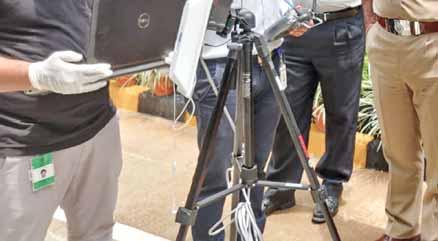
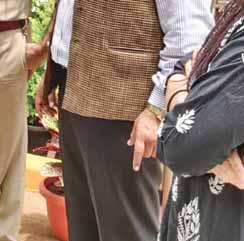

both parties. Earlier some farmers were dumping their yield as there was no transport available. Immediately the Rotarians reached out to them,” said Yvonne John Daniel, member of RC Bangalore Kalyan.
Harsha M V, a member of the same club, is working with the City Police Commissioner Bhasker Rao and ADGP P S Sandhu to operate drones to create public awareness on COVID-19 and for surveillance of people defying lockdown rules in market places and containment zones.
Rotary Clubs of Vidyaranyapura, Vidyapeeta, E-club Bengaluru Green City, Kolar and Bangalore Junction, distributed food packets and grocery kits in their localities. RC Bangalore Chimney Hill provided masks to sanitation workers and refreshments to police personnel on COVID duty. Rotary Bangalore Palmville donated 100 PPE kits to Victoria Hospital. RC Bangalore Orchards provided 10 testing kiosks, 1,000 PPEs and 2,000 masks to government hospitals, besides raising `1.5 crore partnering with two other organisations.
As mid-day meals was abruptly halted for students of the Rotary Bangalore Vidyalaya sponsored by RC Bangalore, the members gave ration kits to the families to last for the lockdown period. Similar service was extended to Home of Hope, an
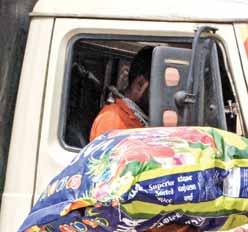

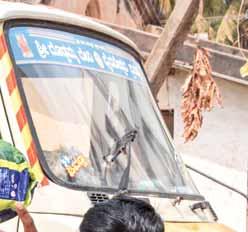


Earlier some farmers were dumping their yield as there was no transport available. Immediately the Rotarians reached out to them.
Yvonne John Daniel
RC Bangalore Kalyan
old-age home and another orphanage in the city. The club arranged food for animals too. The ambulance that the club donated to CUPA, an animal shelter, was used to go around residential areas with volunteers feeding stray animals.
Members of RC Bangalore East, along with their families, prepared lunch and dinner in the club’s community kitchen and distributed to two lakh people. Former members who had left the club also contributed generously for the cause, said Club President M Stephen Paul.
Rotarians of Rotary Bangalore South East are volunteering for a door
to door screening in a 500-household locality with the support of doctors and paramedics.
DG Sameer Hariani conducted a virtual charter ceremony for 33 members of a new club — RC Bangalore Social and “sent their charter certificates by email. Two more virtual charters are in the pipeline,” he said.
The district has around 5,200 members across 130 Rotary clubs and “every club has been doing remarkable projects providing relief to the aged, sick and poor. The members are quick to understand the needs of the people and respond immediately,” he said.

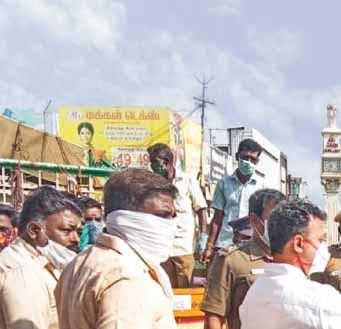
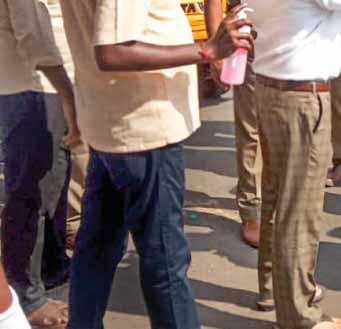
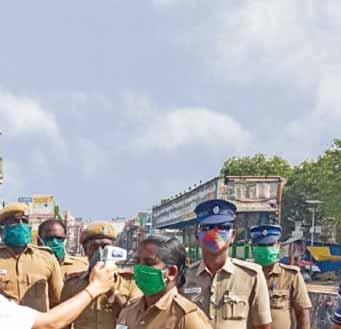
RC Vriddhachalam President A Deepak Chand and his team check the body temperature of police personnel.
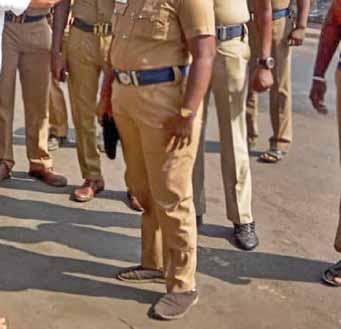

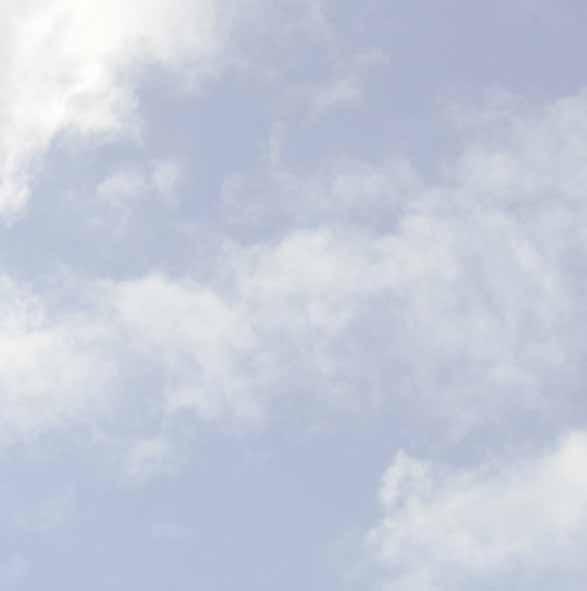
In interior Tamil Nadu, district governors are holding zonal meetings and coordinating with their assistant governors entrusted with monitoring COVID-19 relief efforts at their club-level. DG N Manimaran, RID 2981, has instructed all the 114 clubs across 19 zones to distribute N-95 and basic masks to doctors, paramedics, healthcare workers, sanitary workers and volunteers on a war-footing. “So far, we would have distributed 10,000 N-95 masks to doctors, nurses and other staff at government hospitals and 50,000 basic masks to ordinary people including roadside vendors and vegetable sellers,” says Manimaran.
More than 10,000 hand sanitisers were provided to scavengers, sellers in the local markets, health volunteers and sanitary workers. “Rotarians are collecting funds to purchase and distribute these hygiene products across the district.” On a bigger scale, food packets were distributed to policemen, the poor, daily wagers, healthcare workers and sanitary staff of the civic

bodies and this will continue till the lockdown is lifted, he says.
The Rotarians across Tamil Nadu joined hands with volunteer groups to provide vegetables and foodgrains from ration shops at the doorsteps of residents. RID 2981 has applied for a global grant for the purchase of 15 ventilators and “these will be delivered to the district hospitals once we receive them.” RC Mannargudi, RID 2981, has accommodated 15 ironsmith families from North India in a college hall and they were given free meals three times a day, says DGE Balaji Babu. “With the invocation of Sec 144, they had no option but to abandon their iron casting work and they now rely on the food being offered by the club.”
Fifty-six artisans from Rajasthan, including women and children who were making Plaster of Paris icons and statues of gods, goddesses and other artefacts, were evicted from roadside after the shutdown. “They are now being sheltered in a temple

and food is being given by RC Vriddhachalam,” says Babu.
All the 20 clubs in Salem have come together for a joint fight against the COVID-19 pandemic, says DG A K Natesan, RID 2982. “They provide free food to over 400 patients at the government hospital, distribute face masks at people’s homes and are preparing a database of those suspected to be infected with this virus and the information compiled will be passed on to the government,” says the DG.
Following a request from Dr Dhanapal, the Medical Superindendent at the Mohan Kumaramangalam Medical College and Hospital (GH, Salem), Rotary will be donating an electric batteryoperated ambulance worth `7 lakh from the District Designated Fund.
RID 2982 will be delivering 1,000 units of PPE kits (protective suits against COVID-19) to seven government hospitals across revenue districts, besides 500 N-95 masks to doctors, paramedics, and 10,000 three-layered masks to sanitary workers, health volunteers, vendors
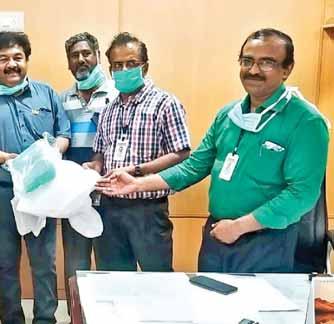





Kiran Zehra
Just after the lockdown was imposed on March 25, RC Pondicherry Cosmos, RID 2982, began with locating displaced people living in camps, pregnant and lactating women from underprivileged backgrounds, unattended elderly and disabled people. “Vulnerable and undernourished communities are at even greater risk of contracting coronavirus,” says Club President A Senthil.
The Rotarians distributed face masks and sanitisers to sanitation workers and police personnel on patrol duty and people coming to receive food packets at the distribution points.
When some Rotarians came across a Narikurava (a tribe in S India that sells bead jewellery to tourists for livelihood) man standing in line for food packet, they asked him the whereabouts of his community members. “We were shocked to know that he was going to share two packets of food with a family of 12 people.” Arrangements were made immediately and the club is continuing its supply of food packets to the tribal community living near the


ECR - Pondicherry highway. The tribal children now recognise Ashok, a volunteer who brings food packets for them as ‘Mask uncle.’
The community kitchen has been set up at the club manager Sivakumar’s residence. “We provided homemade food prepared by our club members to around 150 people stranded at the Rajiv Gandhi Government Women and Children Hospital. Most of them are from neighbouring districts and couldn’t go back home as trains and buses stopped running.”

Senthil wishes that the club could do more than giving migrant labourers just masks and food packets. “Many of them are planning to return to their homes on foot as their accommodation is not arranged. This puts their lives at great risk.”
The club plans to provide breakfast and masks to sanitation workers till the end of the lockdown. Other Rotary and Rotaract clubs have also joined in the initiative. RC Pondicherry Midtown handed over `1 lakh to the CM’s Relief Fund.
and others. RC Komarapalayam has donated 1,000 masks to municipal officials and conservancy workers.
“We are trying to procure 10 ventilators following a request from a senior official of the State Health

Department for such units at the isolation wards of corona patients,” says Dr Natesan. They will also be installing at least 200 handwash sanitising stations at malls, bus terminuses, railway stations, vegetable markets
and other crowded places as a precautionary step against the virus.
Consisting of 68 clubs across 12 zones, this district relief work against the coronavirus is being monitored with regular zonal meetings

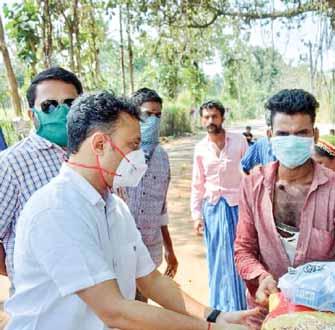
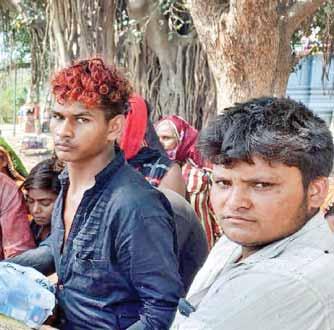
conducted through video conference to take stock of the situation. “I have already done three video conferences with my AGs to activate relief efforts against the pandemic and more steps including campaigns and relief distribution will be taken up,” says Dr Natesan. The clubs in Hosur are providing face masks, hand sanitisers and daily food to some migrant workers of factories that have shutdown, but whose owners have allowed the labourers to stay on the premises with their families, he added.
DG Dr A Zameer Pasha, RID 3000, has instructed the clubs and Rotarians to provide food packets to migrant workers hit hard by the lockdown. “More than 100 Rotarians are on the field to distribute food packets to slums and migrant colonies. Their work is being monitored by 28 AGs who report such activities to seven Regional Coordinators. On an average, we distribute 2,500 food packets a day across the eight revenue districts,” says D Thirunavukkarasu, District General Secretary.
The district clubs are providing 10 five-litre sanitiser cans and 5,000 face masks each to eight government hospitals in the region. “We are also giving 500 PPE protective suits to 10 isolation wards in Trichy and Madurai,” says DG Pasha. Both the district general secretary and executive secretary Jaspreet Singh Sonu brief DG Pasha on the relief work

being carried out by the district clubs on a daily basis.
Moreover, DG Pasha has applied for a global grant of $25,000 under the Rotary Disaster Response Grant from TRF and “once the amount is sanctioned, we will purchase 25 ventilators and more PPE kits which are in great demand in this region,” says Dr Pasha.
DG Pasha has sent out his recorded audio message which is being aired through the public address systems fitted on the mini-trucks used for garbage clearance at municipalities and panchayats. “The anti-coronavirus audio clip, delivered to clubs through 150 pen drives, focuses on maintaining isolation, social distancing and obeying other government measures enforced to keep people safe,” says the DG.
Designed by N Krishnamurthy
Kiran Zehra
Moved by the plight of a woman labourer carrying her six-monthold child in her arms and walking towards her village near Mathura from Delhi, President Rajit Gupta, RC Faridabad Sanskar, RID 3011, and his team set up a community kitchen to feed migrant workers in transit during the lockdown. “All necessary precautions were taken to prepare and pack the food hygienically. About ` 7 lakh were spent on the facility. Besides, club members loaded their cars with food and water packets and distributed them to migrant workers,” said Gupta.
He and a few other Rotarians drove to Agra to buy 800 bread packets and distributed them to the migrating families. “The food packets and bread distribution went on for four days until the migrant workers had all moved out of Faridabad.”
Receiving the food, a grateful beneficiary said: “ Marna hai to
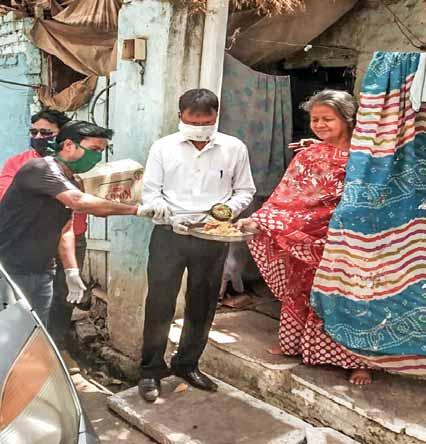
Club members loaded their cars with food and water packets and distributed them to migrant workers.
ghar pe jakar marenge, rone waley to honge (If we have to die we will die at our homes, at least there will be someone to cry for us).” The club is now distributing refreshments to policemen on lockdown duty.
RC Delhi Heritage, RID 3011, in association with the Press Information Bureau, provided 50,000 reusable face masks for distribution to health and sanitary workers, policemen and others vulnerable groups
through the Health Ministry and other government agencies.
In Madhya Pradesh, RC Jabalpur South, RID 3261, is giving lunch packets to policemen and healthcare workers. Other NGOs such as the Jain International Trading Organisation, Jain Youth Association and Motherhood, joined the club in the food distribution.
Rotarians also distributed safety kits to health workers and paramedics at the government hospital in Jabalpur. “As there is shortage of food, masks, sanitisers and gloves at the hospital, we are distributing hygiene kits to hospital staff, oldage homes and the police,” says Club President Akhil Mishra. More than 500 such kits were distributed and 50 more would be distributed with the help of Red Cross Society. Another initiative of the club, Ek phone manavtha ke liye (one call for humanity) is addressing mental health issues by engaging people staying indoors and spreading awareness on the pandemic in the communities and maintaining hygiene and social
distancing. “Eleven of our members have scripted a short conversation on mental health and the need to stay at home. We called every contact in our phonebook and did counselling and requested them to become our safety ambassadors, call their contacts and share the same conversation.”
Thus, waves of phone calls started making rounds in Jabalpur. One of the club members received a call back from a man who thanked the club for having spoken to him. “He said he hadn’t spoken to his son for months because of a dispute. But after our call, he sorted out their misunderstanding and advised his son not to leave the house.”
Food grain bank
Families living in slums were given dry rations from the grain bank created by RC Raigad Steel City, RID 3261. “We collected rice, wheat, dal, dry masala mix and vegetables and distributed 400 dry ration kits to poor families. We will continue this until the lockdown is lifted,” says Om Prakash Modi, past president of the club.
RC Amritsar North, RID 3070, distributed ration kits and food packets to 1,200 underprivileged and migrant families after organising an awareness programme about COVID-19 for them at the Government Hospital.
Doing good with TRF help
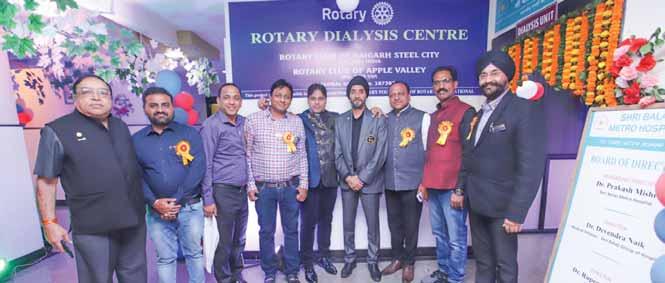
Ranjit
RC Raigarh Steel City, RID 3261, has set up a state-of-art dialysis centre at the Balaji Metro Hospital, Raigad. It is a global grant
project supported by RC Apple Valley, RID 5300, USA and TRF.
Umesh Nandkumar Patel, Minister of Higher Education, Chhattisgarh, inaugurated the facility at the hospital in
the presence of DG Ranjit Singh Saini and club members. Club President Preetpal Singh Tuteja informed that the dialysis facility will be available for patients at a subsidised cost.

V Muthukumaran
Ever since the national lockdown was announced by PM Narendra Modi to break the chain of COVID-19 pandemic, Rtn Ajit Paul Singh Naphrey, mentor and club in-charge, Rotaract Club of Austin Institutes, Jalandhar, RID 3070, along with his two sons — Rtrs Ranjit Singh and Jasjit Singh — wake up early in the morning to join a group of volunteers and social workers to deliver vegetables and other essential commodities to houses at Rupnagar.
Ajit Paul Singh (R) with Rupnagar SP Jagjit Singh Jallah providing food packets to the needy.

There is no shortage of money and resources to meet the many donors and Rotarians having pitched in.
With all the Rotaractors at the diploma institute having gone home after it was shut down till further notice, its Director Naphrey and his sons are not twiddling their thumbs at their residence in Rupnagar near Chandigarh. “We are part of a large teams of volunteers who help the district administration and local police in enforcing the curfew. While poor families and homeless people are given essential items for free, those who can pay are provided the necessities at affordable cost. Rupnagar SP ( headquarters) Sardar Jagjit Singh Jallah is motivating us with support and logistics,” said Naphrey, a member of RC Jalandhar Civil Lines.
So far, he has himself donated `11,000 and “there is no shortage of money and resources to meet the needs of affected families, with many donors and Rotarians having pitched in,” he said.
In a day, this volunteer group distributes more than 1,000 ready-to-eat food packets in and around Rupnagar to the needy hit hard by the lockdown. During January when the virus outbreak was at its nascent stage, these Rotaractors distributed over 1,600 surgical masks to the public including unskilled workers, retailers and pavement vendors. “Eighteen Rotaractors took part in the distribution of face masks and we went about advising people to wash their hands frequently with sanitisers and adopt safeguards against the pandemic,” said Deepika Sharma, Club Trainer and the institute’s administrator.
A blood donation camp for Rotaractors was held with the support of Police Commissioner Sardar Gurpreet Singh Bhullar, and 26 units of blood collected. Deepika Sharma, Mahadaan Coordinator of RID 3070, devised and successfully implemented notable projects in Jalandhar last year, said Naphrey.
In a personal message to PRIP Rajendra Saboo, RI President Mark Maloney said, “You and Team India can take great pride in the accomplishments at Mutare. More than 3,000 patients seen, more than 1,400 procedures completed, and over 500 major surgeries undertaken — these are remarkable statistics marking a
PRIP Rajendra Saboo assisting a patient.
notable achievement. You have made a lifelong impact on so many people of Manicaland. Those you have served will remember you forever.”
Accompanied by Gay, he participated for three days in a 10-day VTT medical mission to Zimbabwe in February organised by Rotary India. A 20-member multi-specialty surgical team included RI Director Dr
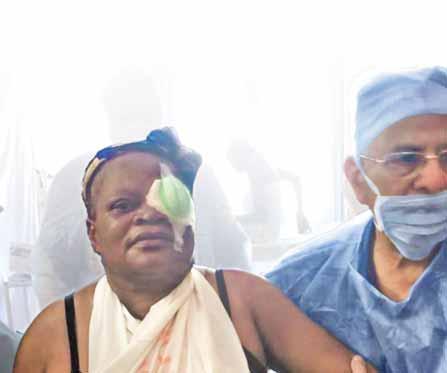
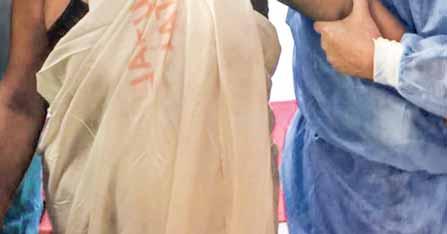

Bharat Pandya who took part as a general surgeon. “The visit of President Maloney and Gay was the icing on the cake. They wheeled in the patients to the operation theatre and shifted out those who had their surgeries done to the wards with consoling, soothing words,” said PDG Madhukar Malhotra, the Project Chair.
The VTT team including Rotarian volunteers was led by PRIP Saboo as their mentor. He was accompanied by wife Usha Saboo. The mission team reached Mutare, the capital of Manicaland Province in Zimbabwe, on Feb 26. The project’s primary contact Rtn Rosette ‘Rose’ Peters, President-elect of RC Chitangwiza, RID 9210, the host district, welcomed them at the airport. Zimbabwe’s Minister of Health and Child Care Dr John Mangwiro helped to expedite clearance of the medical equipment and supplies from the Customs.
Earlier in Nov 2019, Malhotra and Dr Karan Singh, past president of RCRoorkee Midtown, visited Mutare to make a preliminary study on the facilities and medical needs at the identified hospital. He also
did the groundwork for the duty-free import of medical equipment and supplies, hassle-free import of drugs and medicines by liaising with the Drug Controller’s Office.
There were two operating tables at the main OT at the Provincial Hospital used for general surgery, besides one additional table which was used for ENT and plastic surgery requiring only local anaesthesia. The gyneac team used the Saint Joseph’s Mission Hospital. The General Surgery team led by Dr Kuldeep Dhawan and Dr Manoj Sharma performed 69 surgeries, some of them being ‘firsts’ in the history of this hospital.
PDG Dr G K Thakral and his wife Dr Rashmi Thakral, both dental surgeons and veterans of 10 medical VTT missions, completed 1,229 procedures. “The equipment and accessories carried by the team were used to make a defunct dental chair operational and perform many more procedures than would have been possible with only one dental chair,” explained Malhotra.
In skin care, Dr Vinay Shankar, dermatologist, examined over 500 patients and gave free medicines to them. Dr Donald from the Indian Army provided cryogenic therapy for 50 patients with skin infections.
Other doctors in the surgery team include Dr Jagdeep Thakur (ENT); Dr V D Singh (plastic); Dr Ravjit Singh, Tarang Khainar (orthopaedic);
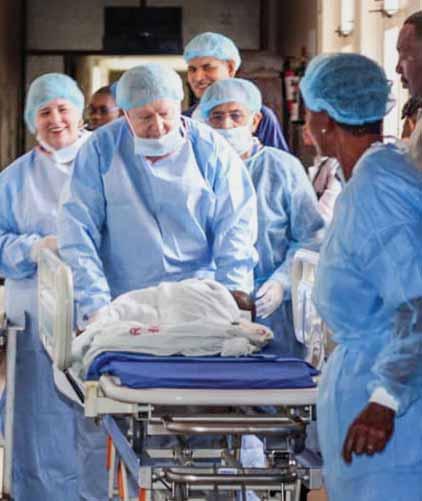
Dr Sushil Saini, Dr Nivedita; and Dr Pankaj Shah (ophthalmic); and Dr Manisha Damani and Dr N S Sandhu (gynaecology). They were supported by anaesthesiologists Dr Vikas Tyagi, Dr Gian Chand, Dr Dara Singh, and Dr Surinder Singh.
Local doctors gain expertise
Hundreds of needy patients got free surgeries which would have cost huge money and could not have been possible in Zimbabwe even on payment.
The host doctors at the Mutare Provincial Hospital worked along with Indian surgeons who completed 506 surgeries and 1,334 procedures during the mission. Training sessions on new techniques and developments in surgeries for the host doctors were organised.
RI Vice-President Olayinka Babalola from Nigeria called on Zimbabwean President Emmerson
Mnangagwa in Harare which was covered by the national media. As a result a large number of patients turned up the next day at the Mutare Hospital; but due to shortage of facilities, medical supplies and paucity of time, over 1,500 needy people were not able to access the services of the VTT team at the provincial hospital.
President Maloney and Gay, along with RI Vice-President Babalola stayed at a modest hotel as the VTT team and joined the review meeting in the evenings, and shared a modest, working lunch at the hospital. “I look forward to joining future medical VTT missions once my tenure as RI Director ends,” said Dr Bharat Pandya, who performed some difficult surgeries.
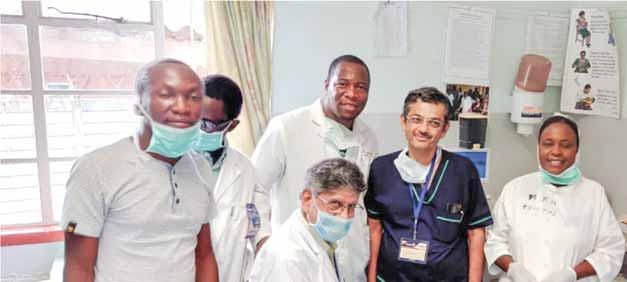




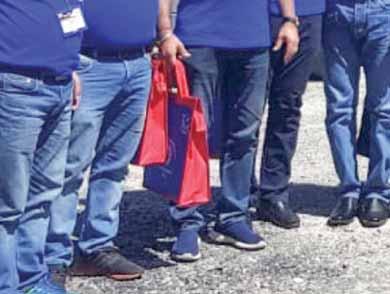


The team carried 1,600 kg of medical equipment, instruments and supplies.
District Governor Jitendra Dhingra and his wife Ritu played an exemplary role as volunteers, taking full responsibility for hospitality including lunch and snacks for the doctors, caring for all their needs.
DG Dhingra used his culinary art in preparing some Indian dishes for dinners in the hotel kitchen, and Ritu was conducting early morning yoga sessions. There was no small or big work for them. PRIP Saboo said, “I am proud of the couple who are truly bonding factor in our team”.
Dr Ellen Gwaradzimba, Minister of State for Manicaland Provincial Affairs, thanked Saboo as he offered to fully equip the Sakuba Eye Hospital, which lacked facilities, if the local authorities in Mutare could build a new building to meet growing requirements.
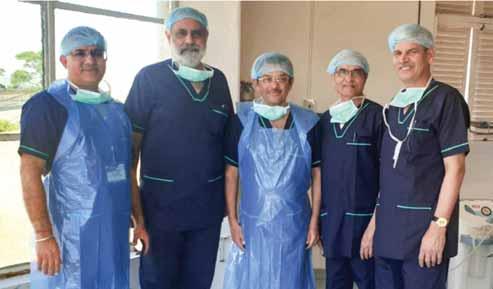




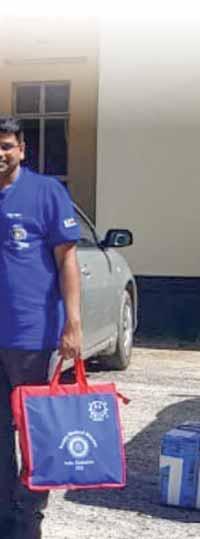

PRIP Saboo also promised that his club, RC Chandigarh, will sponsor the congenital heart surgeries in India for 10 children from Zimbabwe as a token gesture which was met with much enthusiasm. The minister thanked the VTT medical mission from India as “hundreds of needy patients got free surgeries which would have cost huge money and could not have been possible in Zimbabwe even on payment.”
PRIP Saboo is organising VTT medical missions to Africa since 1998. The first team went to Uganda and since then one or two teams have been going to Africa every year. Keeping a promise he had made to late RIPE Sam Owori, PRIP Raja Saboo has aimed to send a VTT medical mission to every Rotary district in Africa. “After Sam died, (the then) President Barry Rassin said to me, ‘Raja, let us see if we can fulfil the dream that Sam had.’ So now we are planning on that,” he added.
Kiran Zehra
RID 3170 is one of the first districts to receive the Disaster Response Grant of $25,000 from TRF within three days of applying for the grant. Even before the grant was approved the district engaged the Rotary Hubli Dharwad Disaster Relief Task Force to reach 40 PPE kits worth `80,000 to the Karnataka Institute of Medical
Sciences (KIMS), Hubli, which has been converted into a COVID-19 specialty hospital. “One of the biggest challenges was finding a distributor with a pass to cross the toll gates,” says PDG Ganesh Bhat. Finally, a distributor was found and with the help of Rotary clubs along the route, the package was delivered to the hospital within 48 hours.The Task Force had donated 100

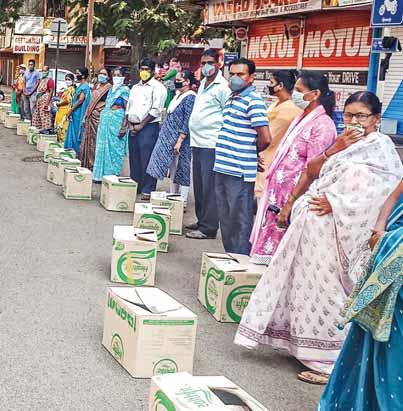
Beneficiaries with their relief kits given by
Shelter Kits to flood victims in Oct 2019.
The grant fund from TRF will be used to provide masks, PPEs, gloves, sanitisers, clean drinking water at government hospitals, and to transform marriage halls into temporary hospitals. DG Girish Masurkar thanked Rotary India’s senior leaders “for helping us with a speedy dispersal of the grant amount. “President of RC Kolhapur Suryakant Patil and AG Prakash Jagdale distributed food and essential items for stranded civilians and migrant workers in camps set up in the city.The Rotarians of RC Panaji Riviera volunteered to work with the city Corporation to deliver groceries for the residents of Panaji and distributed groceries to migrant labourers, slum dwellers,
NGOs taking care of HIV positive children, street children and old age homes. Ration boxes each containing 5 kg rice, 4 kg atta, 1 kg each of dal, onions, potatoes, and 1ltr oil were distributed among 850 garbage plant workers in Panaji. The United Nations Development Programme, India office, had tweeted its appreciation for the club’s efforts.”
Similar boxes were distributed to 5,000 needy people over 10 days, in association with the Indian Red Cross Society, Goa Chapter. The club raised an additional `5 lakh for grocery distribution and donated 50 PPE kits to doctors at the Goa Medical College and the Department of Health Services. The club members contributed `1,000 each to the PM CARES Fund.
Co-chair of the Bill & Melinda Gates Foundation
1What made you decide to work on polio eradication?
In 1952, three years before I was born, the US experienced one of the worst polio epidemics in its history. Thousands died and even more were paralysed. I was born a few months after the first polio vaccine became available. Growing up, I had no idea how lucky I was.
Later in life through the work of our foundation, I began to see firsthand the impact that polio was having on kids. The US had seen its last case of polio in 1979 thanks to polio vaccines, but even 25 years later in 2004, more than 1,000 children in Asia and Africa were paralysed by polio simply because of where they were born.
Before our foundation joined the fight to end polio in 2007, I had spent months talking to experts and analysing the history of eradication. While global progress against polio had stalled, I believed that eradication was possible because the world had done it before, with smallpox in 1980.
Rotary played an important role in inspiring the foundation to become involved in the Global Polio Eradication Initiative, an incredible global partnership committed to fighting the disease. We knew that Rotarians would be passionate, committed allies in the push for eradication.
2The number of polio cases increased in 2019. Why are you still optimistic that eradication is possible?
It’s true that we saw the number of cases go up in 2019, but we need to look at what has happened over the past three decades. In the 1980s, polio paralysed 1,000 children globally every day. Today, that number has fallen 99.9 per cent and the wild poliovirus
is confined to just Afghanistan and Pakistan. Because of eradication efforts, there are 18 million people walking around who would have otherwise been paralysed by the virus.
The past 30 years have been marked with incredible achievements. One of my favourite examples is India. The country was once considered the toughest place to eliminate the disease, but in 2011, the country recorded its last case of polio derived from the wild poliovirus.
In 2013, health workers managed to contain a wild poliovirus outbreak during the Syrian civil war. Vaccinators not only had to enter the war zone, waiting for lulls in the fighting to make sure children were protected, but also had to account for the 2 million refugees fleeing to neighbouring Iraq, Jordan, Lebanon, and Turkey. Within weeks, the World Health Organisation (WHO) announced a plan to immunise 2.4 million Syrian children, and the outbreak was over by the following year.
In 2016, the wild poliovirus re-emerged in Nigeria. Health workers and partners redoubled their efforts, and the country has now gone more than three years without a new case, which means the entire WHO African region could be certified free of wild poliovirus in 2020. This achievement was difficult to imagine just a few years ago.
The final cases of polio are proving particularly difficult. But the polio programme has overcome enormous challenges to keep driving progress, and we’ve spent the past decade sharpening the tools and strategies we need to finish the job. With the continued

commitment of our partners like Rotary, I’m sure we’ll consign polio to history.
3Why are you extending the Gates Foundation’s 2-to-1 funding match with Rotary?
The Gates Foundation’s long-standing partnership with Rotary has been crucial in the fight against polio. Through extending our funding match, we can raise $150 million every year — money that is essential to the eradication effort.
But there’s another thing about this funding match, which people don’t often know: The money helps us fight more than polio. At the same time that we’re delivering the polio vaccine to communities, we’re also bringing them bed nets to protect against malaria, improving access to clean drinking water, and helping immunise kids against other vaccinepreventable diseases. We’re making sure that every dollar we raise counts.
4What message would you like to deliver to Rotarians as we confront the final challenges to eradication?
Everyone at our foundation is inspired by Rotary and proud to work alongside you. Rotary was the first organisation to push for a polio-free world. And for the past 30 years, so many Rotarians have been part of fundraising, vaccination, and advocacy efforts that have brought us close to the magic number of zero cases.
The final steps to a polio-free world are the hardest — and we’ll need the help of every Rotarian to get there. But I’m confident that we will end polio together. ©
Following a 50-year-old tradition and legacy in a tiny space in Shankarpuram, Bengaluru, the Brahmin’s Coffee Bar is one of the much loved coffee hubs for the Bangaloreans. On every corner of Bengaluru’s streets one can find such small cafes but the Brahmin’s Coffee Bar has
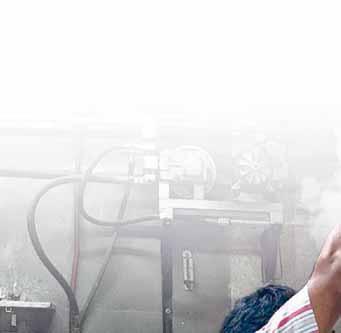
been famed for its age-old traditional taste of South Indian dishes and inheritance. In an age of multi-cuisine fast food joints this tiffin (snacks) cum coffee hub is famous for its signature


dish — the ‘one-by-two’ coffee, idli-vada-kara bhat-kesari bhat combo with delicious chutney. As I step into this quaint coffee shop, I find it overcrowded; people are enjoying their filter coffee and it is a sight to watch the coffee master make the milk frothy and
The Coffee Master making the milk frothy.
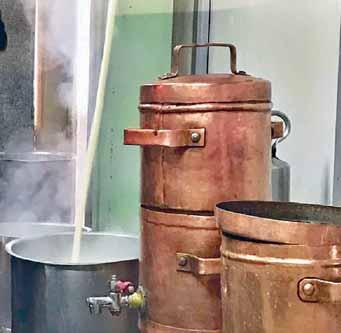


mix the heady coffee decoction to it. In a far corner is another staff whose role was to keep dishing out the chutney. I also note that no sambhar or rasam is served with the tiffin unlike the customary South Indian style.
It is a self-service system and there is no seating facility. Rather the tiny hall has tables on which customers place their plates and eat their food standing, and more people spill out on to the road too. Radha Krishna Adiga, the owner of the café, recalls the early days which led to the setting up of the shop. He says, “My father K V Nageshwar Rao, along with my mother K N Saraswati from Udupi district in Karnataka, started preparing and selling some South Indian dishes on the streets of Bengaluru for their livelihood in the 1930s.”
In 1965, Rao and his eldest son N Shankarnarayan commenced a small venture under the name, ‘Brahmin’s Coffee Bar’. Rao’s wife started making kara bhat (Upma ) with chutney and that became an instant hit among the customers. In 1970 with increasing popularity a few more items such as vada, idli and kesari bhat, a sweet dish, were added to the menu. Since
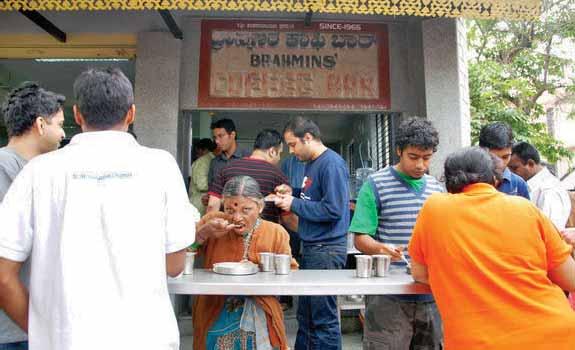
1972 Radha Krishna Adiga, Rao’s another son, took over the venture. Today, with over 14 employees, the coffee shop is a landmark joint in the city. It opens at 6 am and runs till noon, and in the evening, from 3 to 7 pm. The staff begin cooking at 4 am every day. The unique selling point of this small joint is the consistent taste since 1965 when it was popular for its homely
p p y preparations. Today, many customers in and around S hankara pu ram and Basavangudi take parcels
Hot filter coffee served in glass tumblers.
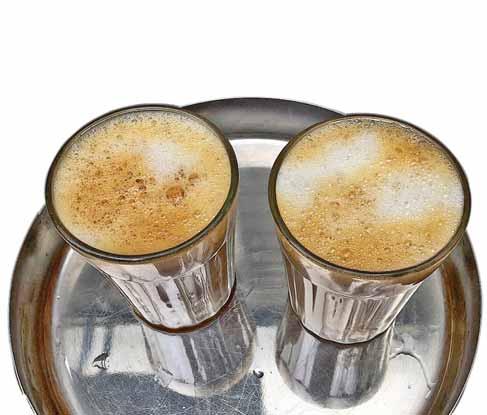
home, packed with extra helpings of chutney.
“To maintain an age-old tradition and follow the legacy we believe in the philosophy of consistency. Most of my clients are coming from the initial years and I know them by their name and faces,” says Adiga, adding that with a boom in the IT industry since 1995 people have migrated to Bengaluru, and that “the sumptuous taste and consistency in our food items” has drawn more clientele to his food joint. With the Brahmin’s success other similar South Indian food joints are running with similar names; but people too are very smart as they are well-acquainted with the taste of the Brahmin’s original and authentic food. With longstanding quality and taste this food joint is giving tough competition to other similar South Indian food spaces. Loyal customers for decades drive long distance on weekends just for their love of the Brahmin’s filter coffee and chutney.
The writer is member of RC Jaipur, RID 3054.
Pictures by Anubha Jain
Designed by N Krishnamurthy


Neena Sondhi
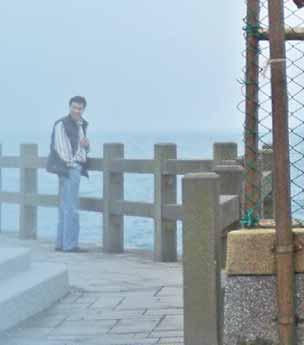


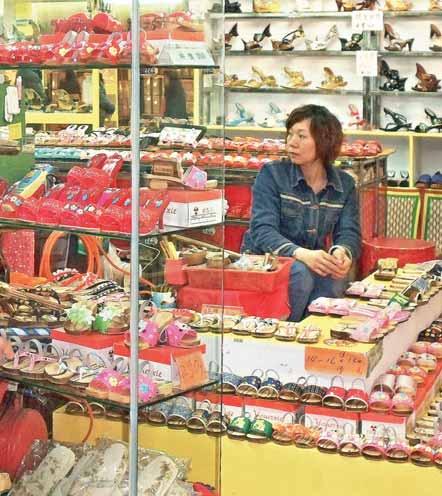
Afew years ago we were invited to Taiwan, a place we did not know much about. There were some official meetings, but we had some extra time to see some of the northern areas during our 4-day stay there. Our hosts, the Taiwan Sporting Goods Manufacturers Association, were very helpful and gracious, so we really enjoyed our sightseeing.
We were based in Taipei (‘pei’ means North in Mandarin), the capital, and decided to keep our journeys short, and see what we felt were interesting in this area
Our first outing was to the Northeast coast to visit some villages. We were a small group with excellent
local guides. Enroute, we first stopped at a small Buddhist temple. This was near the seacoast, and was very colourful… and literally so. Further on, we stopped again to admire the unique rock formations on the seacoast. There was one shaped like a human nose, another which formed an abstract shape; and yet another in the shape of a fish that looked as though it was embedded on the rock. The rocks were all shades of brown, having been weathered by the wind and rain.
Our next stop was at some small shops in a lane, somewhat like an arcade. These displayed goods, unique to Taiwan. Here we were introduced to yam soup, which I found delicious. Even the dried
fruits (small oranges, plums) and local cakes were treats to cherish there and we took some home. Children’s sandals and ceramic, animal shaped flutes were good souvenirs from this arcade.
From here we walked towards a small village
perched on a steep hill, and hence difficult to climb up. We had learnt earlier that gold was mined in this area, so the closely packed houses were built clinging on to steep mountain side. Now the gold is gone, but the quaint houses are left, with
shops and temples dotted in between.
The next day, we went north of Taipei to visit the beautiful Yangmingshan National Park. It is spread over a large area and has several places of interest.
First, we visited the Chungshan Hall which
was built over 40 years ago, and first served as the home of the National Assembly (now defunct). It is a beautiful building, combining modern Taiwanese architecture with traditional Chinese artifacts and designs incorporated in the interior.
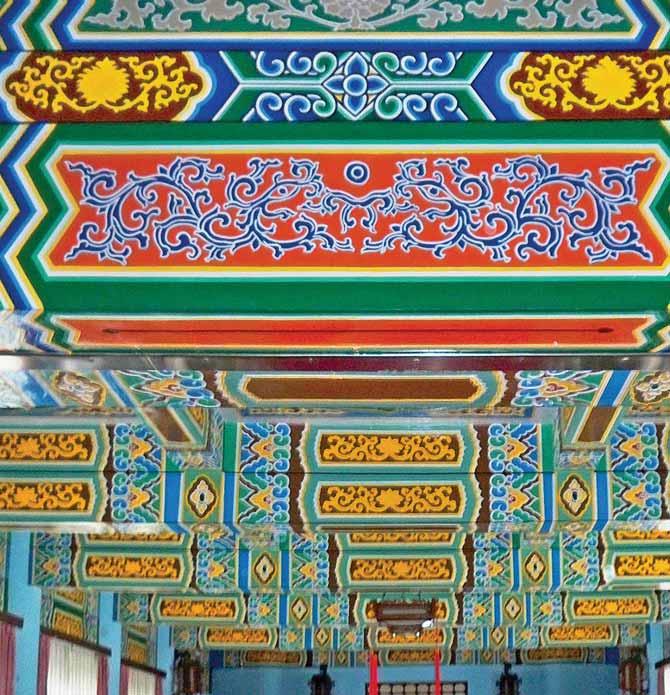


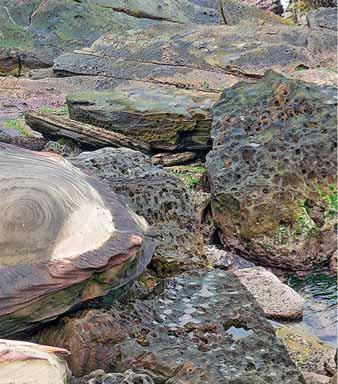

It is set in the mountains, and the grandeur of its exterior blends beautifully with its surroundings. Interestingly, it is built over a soft and hard base of sulphur springs. Sometimes we could see the uneven floors and smell the sulphur (like rotten eggs). This has been the venue for many state visits and banquets and also houses an exhibition of contemporary historical events of Taiwan.
After visiting a beautiful park, we travelled to the Hot Springs. The area we were in, the Tatun Mountain range, has the largest number of hot springs.
The Yangmingshan Hot Springs, the ones we visited, were of the mild alkaline sulphuric kind. We had a choice of two types of bathing, open (without clothes) and private. Bathing in hot springs is supposed to be beneficial for several health problems and is also relaxing. However, out of our group of 10, only two of us took the plunge! It was a refreshing experience, taken inside a private bathroom, but other benefits were not noticeable straightaway!
The first two trips were organised for us, but we also did some unscheduled roaming around. Our hotel
was near a shopping mall, so we took a walk to it and around it, a couple of times. It was well laid out and full of beautiful shops.
Another trip we did was to the erstwhile tallest building of the world, Taipei 101. This tourist spot was thronging with people. We queued up and went to the top of the tower in a high-speed lift and from there got a panoramic view of Taipei. Also there were many souvenirs to buy and nice places for refreshments.
On our last day we visited ceramic factories full of beautiful, artistic pieces, but too huge and heavy to take home. But
we did pick up some small souvenirs, tea, etc. But what made the trip most memorable are the Taiwanese people who are very warm and hospitable, just like Indians, and very fond of art and natural beauty. The beautiful artifacts in the hotel lobbies and the gorgeous flowers were visual treats. We saw many colourful orchids… their size, colour and variety are a delight for flower lovers.
The writer is past president of RC Jalandhar South, RID 3070.
Designed by Krishnapratheesh S
Samanvaya, the District Conference of RID 3170, brought together 1,500 Rotarians, along with their families, Rotaractors and Interactors to network and bond with each other and share best practices, over three days of a variety of programmes. The event was hosted in Hubli by Rotary Clubs of Hubli, Bagalkot and Vijayapur.
“Samanvaya means to harmonise and there was ample opportunity for the
Rotary family to deepen acquaintances and further relationships,” said DG Girish Masurkar. Ten visiting Russian Rotarians too attended the event.
Following the welcome address by Conference Chair S K Yadahalli, PDG Nitin Dafria of RID 3040, the RI President’s Representative, spoke about Rotary’s accomplishments globally in 114 years and Rotary India’s 100-year milestone journey. He was accompanied by wife Divya.
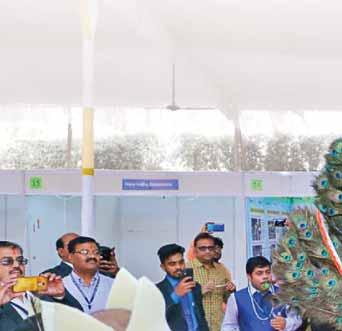
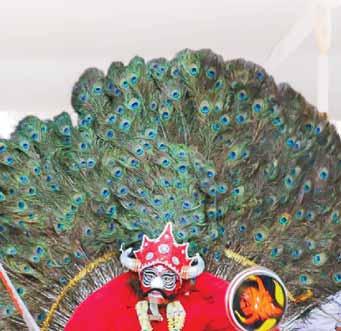
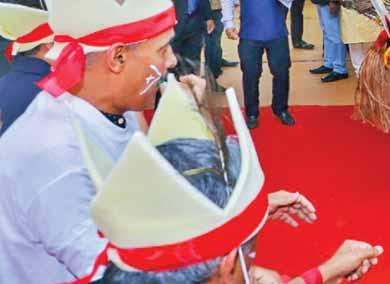
Masurkar spoke about RI’s rich legacy and its role in the formation of the United Nations. Going into history, he said that Rotary holds a privileged consultative status offered by the UN’s Economic and Social Council, and RI representatives serve as observers in various meetings. RI and the UN have a productive partnership in polio eradication, literacy, water and sanitation projects, cultural exchanges and promotion of peace conferences around the world.
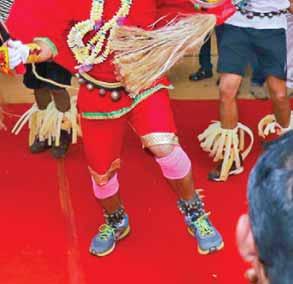




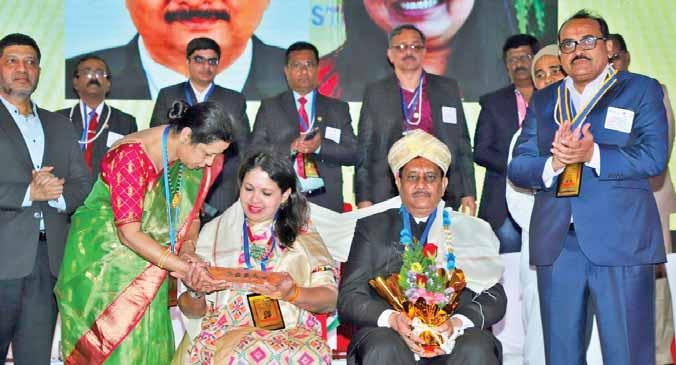
In 1945, PRIP T A Warren titled a week in October as ‘United Nations Week’, which in 1953 was changed to ‘Rotary UN Day’ by the UN General Assembly. “Against a backdrop of such remarkable heritage we should be proud to be Rotarians and take care to preserve the goodwill and trust the organisation has built over the years,” he said.
Several delegates participated in a 10-km cyclothon organised as part of the conference to promote Rotary’s projects in the six focus areas.
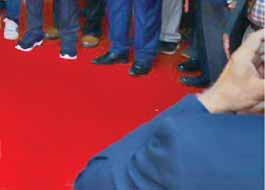
Against a backdrop of such remarkable heritage we should be proud to be Rotarians and take care to preserve the goodwill and trust the organisation has built over the years.
Kiran Kumar, former chairman of ISRO, captivated the audience with an account of the Chandrayaan and Mangalyaan missions. Prabhu Rajiv Lochan Das of ISKCON talked about leading a meaningful life. Ashok Dalwai, Additional Secretary, Ministry of Agriculture and Farmers’ Welfare, elaborated on GoI’s missions — Doubling of farmers’ income and Jal Shakti Abhiyan. “We were so impressed by his talk that we arranged impromptu a session for farmers the next day; 200 farmers attended it,” said Vasuki Sanji, Conference Secretary.
RIPR Dafria, RRFC Avinash Potdar and DRFC Pranesh Jahagirdar spoke about TRF, district and global grants and the various ways of contributing to the Foundation.
IPDG Ravikiran Kulkarni presented the awards to Rotarians for their outstanding performance last year.
V Muthukumaran
During the lockdown period, RC Baroda Metro, RID 3060, has teamed up with The Edu Club to send worksheets to primary schoolchildren through WhatsApp on their parents’ phones so that “they can utilise this free time usefully and gain some learning skills,” said Kalpa Rachh, Project Chair of Udaan, an early age education project which aims to equip students from underprivileged families with ‘four core foundational skills’ for a bright future.
Out of 700 mobile numbers of parents they got through the school authorities, to which the daily exercises are sent,
75–80 of them respond with completed worksheets making the project volunteers happy. Project Udaan is a three-year-old Rotary project that targets students from UKG to Class 4 in government schools “where students hail from lower- middle class families and whose parents aspire to give their children quality education in spite of their daily struggles. Poorer students from private schools are also included,” said Kalpa. She and Preya Desai founded The Edu Club six years ago. After Rotary came on board three years ago, they fine-tuned the strategy that mainly involves taking an Udaan period (or session) in a week throughout

the academic year at the targeted schools. This year, classes are being held in six private and two government schools covering 2,200 students in Vadodara. “Over the last six years, around 8,000 students had benefitted from our programme. Earlier, this project was meant for Classes 1–6, but from this year, we are focusing on children from UKG to Class 4, and have covered 5,000 students in three years,” explained Kalpa, adding that the content is made available in Hindi and Gujarati also.
Foundation, the key “Students from poor socio-economic backgrounds find it difficult to
Rotaractors and Rotarians of RC Baroda Metro with KYB Conmat Managing Director Premraj Keshyep, a project donor (centre), at the prize distribution ceremony of the Inter-school Quiz Competition.
cope with subjects as they go up the ladder and there is need to strengthen the foundation learning skills at early age to prepare them better for higher education,” she said.
The four key fundamental skills taught are reading and writing English (phonics); math (numeracy); brain exercises (logical reasoning); and socio-emotional skills (motivation and dealing with difficult situations). Brain scans of poor children reveal gray matter less by six per cent with less surface area, thus resulting in learning deficiency by the time they reach Class 6. “But the brain is extremely flexible; with the right inputs and
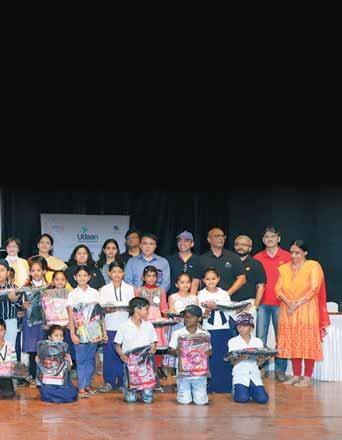
We have started adopting Udaan techniques to teach our regular subjects and the methodology is just it easy to understand and apply concepts.
Darshna, a teacher
mind exercises, it can be improved,” she said.
Six Rotarians with expertise in academics help to design the core curriculum, another 20 sponsor the programme. At the Annual Day the Rotarians were thanked by the parents as at the Inter-school Quiz Competition held at the SSG Medical College Auditorium the students did extremely well.
“Our aim is to transform students with holistic development of their personality. At the end of the sessions, they become confident with soft skills like the ability to convey their ideas boldly and an analytical mindset,” said Subhash Sharma, Club President.
Parents, teachers happy Bharat Rohit, father of Hanshit who is studying in Little Flowers School, is all praise for the worksheets being received
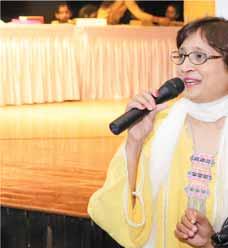
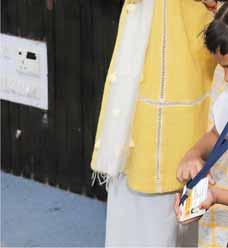
from Udaan coordinators.
“It helps us also to learn new things. I have learnt many new English words through the phonics worksheets,” he said.
Mother of Navya Bhagat at Dr Homibhabha Prathmik Shala was elated that her child was on stage taking part in competitions with confidence. “I feel proud to see my daughter on the big stage on such a big occasion.” Kunj Joshi at Uma Vidyalaya looks forward to attend Udaan classes and “he never misses it as it boosts


his confidence,” said his father Vishal Joshi. School Principal Geeta Gandhi said even teachers observe the proceedings and find the sessions interesting. “There has been no absenteeism in these classes so far.”
Darshna, a teacher in Little Flowers School, said, “we have started adopting Udaan techniques to teach our regular subjects and the methodology is just perfect as students find it easy to understand and apply concepts.” In the next 4–5 years, Udaan
classes will make a great impact on students, said Kaushik Amin, Principal, Aditi Vidyalaya.
Impressed by the project, DG Anish Shah has assured that Project Udaan will be rolled out across the district from the next Rotary year. PRID Manoj Desai and spouse Sharmishtha, members of RC Baroda Metro, have taken keen interest in this project and as a guiding force, “they are helping us to scale up the educational project across Gujarat,” said Kalpa.

DG Debashish Das (fourth from R) distributing gifts to children at the school.
TheLaharu Basti Primary School, about 20km from Siliguri in West Bengal, is transformed into a Happy School, thanks to
Rotarians of RC Siliguri Green, RID 3240. The remote tribal school now boasts of classrooms spread over an area of 1,850 sqft, a robust
compound wall and gate. The classrooms have been painted, fans fitted, blackboards restored, playground levelled and play equipment installed. Khageshwar Roy, MLA of Rajgunj, who inaugurated the renovated school, appreciated the efforts of the club members. “They have given a wonderful gift to the village, and the villagers should maintain this,” he said.
DG Debashish Das interacted with the students and parents at the school and distributed t-shirts and
Abooks to children. Rajib Chakroborthy, the District Education Officer, said, “It is hard to believe that a neglected primary school in this part of the state could be revamped in such a wonderful way.”
Student enrolment has improved and “we hope to improve a lot more facilities in the school,” said Project Chairman Abhishek Garg. Over `400,000 was spent on the project and Club President Animesh Agarwal hopes that more villagers will be motivated to send their children to the school.
Robotics lab was set up at the D S High School, Sion-Dharavi, by RC Mumbai North Island, RID 3141, thanks to a grant from Rajendra and Shubhalaxmi Chhapwale Endowment Fund in which Trustee Gulam Vahanvaty is one of the trustees.
The idea for the stateof-the-art Innovation Centre of Robotics, IoT and 3-D Printing was mooted by Rtn Rajendra Chhapwale, an AKS member, who felt the need for such a futuristic centre and encouraged wholeheartedly for the success of the project, said Urmila
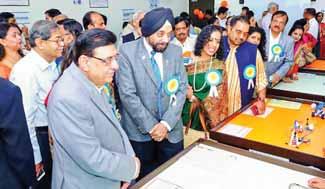
Centre.
Prabhu, Club President. She, along with Project Chair Bhupendra Shah, worked for setting up the facility at the school.
The centre was inaugurated by DG Harjit Singh
Talwar in the presence of playback singer Shankar Mahadevan and Rotarians. With over 3,500 students, D S High School is one of the biggest government-aided school in Maharashtra and
has mostly students from underprivileged families. “The schoolchildren have no exposure to basic computers or laptops. So this centre is a huge boon for them,” said Urmila.
The centre aims to inculcate in the students the habit of innovative thinking through application-oriented methodology. The centre has the capacity to handle five batches of 30 students each in a day. On successful completion, the students will be given diploma certificate that will help them get a job in the industry.
Jaishree
Nothing gives us great pleasure than seeing a child sleeping peacefully. But unfortunately, not many children enjoy the luxury of a good sleep. We see children, even infants, sleeping on platforms and other unhygienic places, and mostly with just a tattered piece of cloth for a bedsheet, says Sarfaraz Potia, President of RC Pune Cantonment, RID 3131.
This thought has been the driving force for the club, over the past 25 years, to distribute sleeping kits to little children hailing from underprivileged families under its project, Children’s Bliss Sleeping Children Around the World (SCAW) sponsors the project while the club identifies the beneficiary children and the source for the products. Each kit contains 28 items including a mattress, mosquito net, clothing, footwear and some school supplies. The Rotarians purchase the items locally at a subsidised price. “This is our 26th year. We distributed 8,000 kits worth `1.52 crore among children studying in ZP schools around Pune and Sangli,”

A mother receives a sleeping kit from a Rotarian at the distribution camp in a school.
says Potia. Seven volunteers from SCAW had come down to Pune from Toronto, Canada, and interacted with the children to understand their needs and dreams.
“Pune is special for SCAW because the idea was born here for its
We too share Dryden’s dream — of a world in which every child makes up refreshed and energised to a day of possibilities and promise.
Sarfaraz
Potia
President,
RC Pune Cantonment
founder Murray Dryden,” says Potia. Dryden, a former brick salesman, while on a trip to Pakistan, was moved by the sight of a child sleeping on the street and, in 1970, along with wife Margaret, started a global movement for helping children sleep better. He first travelled to Pune to purchase and deliver 50 sleeping kits for street children and today 2,000 volunteers dedicate their time and energy to sleeping children worldwide.
Potia shared an incident when Dryden’s son Dave visited an Indian village in 1992 to distribute sleeping kits for schoolchildren.
“He visited a neighbouring school to see the conditions the local children faced and was left speechless when he saw a portrait of his father hanging on the wall in one of the classrooms.
Dryden had been in the village the previous year to give bed kits to children. This is the impact of the project, 8,000 miles away from its home.”
The project is close to every member’s heart, says Potia. “We too share Dryden’s dream — of a world in which every child makes up refreshed and energised to a day of possibilities and promise,” he adds.




A book written in the aftermath of the Rwandan genocide holds much wisdom, comfort and caution for a world locked down
Angel Tungaraza is Tanzanian. She lives in Kigali, Rwanda, with her husband, Pius, on deputation to help the small nation rebuild itself following the genocide resulting from the hatred between two groups of people, a hatred further fanned by politics. Now the killing has ended and the people are attempting to see themselves as Banyarwanda through a process of justice and reconciliation. Angel and Pius live in an apartment complex that houses people from different parts of the world, including an Egyptian, a Japanese American, and even a CIA agent hiding a big secret from his unsuspecting wife but which is known to everyone else in the building. This, very broadly speaking, is the platform from which Gaile Parkin’s mouthwatering yet oxymoronic title, Baking Cakes in Kigali, takes off. And yes, Angel is a baker.

Before we get to the warm smell of baking, a word about why this book at this time, and why it is a book for our times. After all, it was published some 11 years ago. Well, there are several reasons why this book
Fortuitously, she is visited by Odile, a nurse working in a centre for those infected with the virus. Odile places an order for a cake for her brother and when, in the course of conversation, Angel confesses her anxieties concerning the girls, Odile invites her to send the children to her centre where, she says, she can talk to them about the disease and about sex, and answer their questions. Yes, the virus referred to is AIDS/HIV. Events, ideas, customs, ways of thinking… there’s so much to identify with even as you discover many different ways of seeing and believing.

recommends itself to be remembered (in my case) and read (if you haven’t already). For one, the copy I possess has a wonderfully cheerful cover, all pink and gold! More significantly, it recalls a particularly painful period in the history of a small country beset by a tragedy of improbably massive proportions, much like the situation we find ourselves in today, when all seems lost. As you turn the pages and allow the words, and the pictures the words conjure up, to sink into your consciousness, you encounter several familiar and unfamiliar textures and flavours that greet your tongue and taste-buds. One example is the frequent reference to a ‘virus’ that takes many lives, including those of Angel’s children which leaves her to mother five grandchildren.
As Angel explains to the wife of an ambassador who comes to order a cake, “Our children are taken and we’re made parents all over again to our grandchildren. It can be a bullet. It can be blood pressure. But in most cases it’s the virus.” Angel worries that her two granddaughters will fall prey to the virus if they’re not careful.
This is Gaile Parkins’ first book. Having spent a large part of her growing years in Africa, she went to work in Rwanda among women and child survivors after the genocide. In an online interview published in BookBrowse, she speaks about how she came to write this book: “… my time in Rwanda filled me with things I needed to say, things that people weren’t really interested in hearing me say, because they already knew all they wanted to know about that place: that it was dark, bleak, horrific. I wanted them to know the much wider truth: that life and hope continue; that people still find countless reasons to celebrate; that I shared more laughter there than I ever had anywhere else. It seemed to me that fiction was the only way I could convey all of that.”
Many stories are shared in this overarching story: as customers fill out Angel’s Cake Order Form,

Someone who visits the site in Gikongoro along with Angel and Pius, writes ‘Never again’ in the visitors’ book, a clear reference to the holocaust.




Modeste who has another girlfriend as well; there are references to professors at the university including a Prof. Pillay who teaches entrepreneurship and who can sometimes be a little theoretical which is why Angel is invited to talk to a bunch of students who have formed a group called Girls Who Mean Business so they can learn to be entrepreneurs; there’s a visit to a killing site in Gikongoro where 60,000 “people had been lured by the promise of protection, only to find themselves surrounded and systematically slaughtered…”

There is something therapeutic about cooking, whether it is baking or rolling out rotis or chopping onions, especially in times of stress or distress.
they relax, sip sweet spicy tea, leaf through an album of cakes and chat, often swapping stories. It is a warm, intimate, safe space and many of the visitors spontaneously share their deepest thoughts. It works professionally too, for Angel, because she gets clues as to exactly what kind of cake would best suit her client’s needs and the occasion.
If this sounds formulaic, it is not. Firstly, the descriptions of the cakes themselves are fascinating. There is something therapeutic about cooking, whether it is baking or rolling out rotis or chopping onions, especially in times of stress or distress. Scan the social media right now and see how much talk there is about this recipe and that, and how many people have confessed to rediscovering the kitchen. Despite COVID-19, there are mouthwatering recipes and photographs of food doing the rounds. So, too, in Baking Cakes: it’s therapeutic. Secondly, we get many glimpses of the real life being lived in the neighbourhood; often Angel is the thread holding everything together. There are the security guards; there’s Leocadie who runs the local provision store and her troubles with her boyfriend
Someone who visits the site in Gikongoro along with Angel and Pius, writes ‘Never again’ in the visitors’ book, a clear reference to the holocaust. Pius says, “… if those words had meant anything then, there would not be places like the one we’ve just been to today…”, to which comes the reply, “No doubt sometime in the future there’ll be some other slaughter somewhere, and afterwards somebody will write in a book never again — and again those words will mean nothing. Eh, but at least I wrote something.”

is unpretentious and appeals directly to the heart. You hear the truth of the voices, much of it surely stemming from Parkins’s personal experiences of working in Rwanda. Although this is a work of fiction, you feel all along that these are real stories about real people, with real meaning for a world experiencing the same reality together today.

Another time, a neighbour called Sophie is having tea with Angel when an upstairs balcony door opens and someone comes out. Sophie tries to hide herself, explaining that she doesn’t want to be seen by the person on the balcony who has embarrassed her by asking her for some condoms. She obliges but now cannot meet his eye. As she tells Angel, “Everybody knows that when a neighbor comes and asks you for some sugar, you give a cup of sugar. That’s the etiquette. But what’s the etiquette for condoms? How many do you give?”
Dark, tragic, yet quirky and charming … the book is all of this and more. And although the writing doesn’t have the sophistication of, say, an Alexander McCall Smith, it
Today, we’re all about social distancing, a practice that is open to questioning at the very least. Parkins’s response to a question about Africa in the 2009 interview puts this in perspective when she talks about ‘ubuntu’, a word in Xhosa and Zulu and a concept in many southern African languages: “ It’s about our shared humanity and required generosity towards one another; it’s an understanding that in helping and empowering others we help and empower ourselves and our entire community; it expresses the dignity, respect and compassion that, as human beings, we naturally owe and are owed; and it speaks of the interconnectedness that binds all people to all other people. A philosophy of ubuntu is pretty much the opposite of the individualism and self-interest…” Staying home, reflecting on ourselves and our lives would, it is hoped, lead us to assimilating the idea of ubuntu. Baking Cakes in Kigali certainly sets the reader in that direction.


The columnist is a children’s writer and senior journalist.
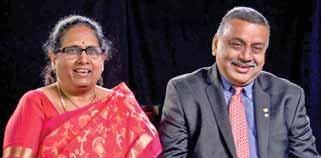
RIPresident Mark Maloney announced that PDG Ravi Vadlamani, RID 3150, is the director nominee for Zones 4 and 7 for 2021–23.
Vadlamani is member of RC Guntur, Andhra Pradesh, and had served as district governor during 2001–02. His wife Rajyalakshmi, a member of RC Guntur Adarsh, was district governor in 2010–11. Vadlamani is known for providing various water schemes, developing school infrastructure and promoting
women’s empowerment in his district. He is recipient of various Rotary awards including Service above Self, Citation for Meritorious Service and Distinguished Service Award.
The two have served as international training leaders at the International Assembly in San Diego and are AKS members.
The Government High School in Barkheda Bonder on the outskirts of Bhopal sports a fresh look after the Rotarians of RC Bhopal Hills, RID 3040, transformed it into a Happy School as part of their Rotary India Literacy Mission programme.
The Club President Col J C Sharma received a request from the school principal to sponsor the school’s refurbishment. “When I visited the school, along with other members, I found it inadequate. About 300 children study here. We decided to revamp it as early as possible,” said Sharma.
The club provided electricity and water connection, installed ceiling fans and LED lights in classrooms, built a handwash station and separate toilet blocks for girls and boys. The floors and walls were fitted with new tiles and the

DG Dhiran Datta inaugurating the refurbished school.
entire school was freshly painted. The classrooms were fitted with windows to facilitate ventilation and an iron gate was put in place at the entrance to provide better security. A sanitary pad dispenser was also installed to help the older girls.
The Happy School was inaugurated within 20 days by DG Dhiran Datta in
the presence of DGN M K Mishra and the Sarpanch of Barkheda Bonder Prem Bai Meena. “The parents and the children who had come for the inauguration were excited to see the makeover and the teachers said that they experienced a renewed zeal to teach in this new environment,” said Sharma.
You can pay the subscription online
Our Bank details:
Bank : HDFC Bank SB Account
Branch : Montieth Road Egmore, Chennai
A/c Name : Rotary News Trust
A/c No. : 50100213133460
IFSC Code : HDFC0003820
E mail us following details: Name of Club
President/Secretary’s name
Amount/Date of transfer/UTR Number
For physical payment by cheque or cash in bank, write Club Name only without prefixing “Rotary club of”. Eg. Rotary Club of Delhi Central should be written: Delhi Central.
Rotarians : 1,217,072
Clubs : 36,118
Districts : 525
Rotaractors : 174,030
Clubs : 10,495
Interactors : 336,421
Clubs : 14,627
RCC : 10,996
As on April 17, 2020
*Please note Interact clubs that have not reported Interact Adviser in the past two Rotary years, are placed in “Suspended” status effective Oct 1, 2019.

During the recent lockdown, a unique online fundraiser titled Manavta Ka Gahna (Jewel of Humanity), was organised by the World’s Greatest Meal team led by Country Coordinator Aabha Jha Choudhary, RID 3011, as part of her End Polio Campaign in April.
The handcrafted jewellery made by Aabha to raise funds for PolioPlus “helped raise `11.2 lakh from this cloud auction, and matched 1:2 by the Gates Foundation, this amount will go to over `33.5 lakh,” she said.
As a multi-district programme, the WGM (www.wgmeal.com) is being carried out in 83
countries building Rotary’s public image while raising funds for PolioPlus.
Unique platform
A TV anchor and social activist, Aabha wanted to utilise her free time during the lockdown by making jewellery. As she started working she realised that the pieces were quite exquisite and this gave her the idea of auctioning it to raise funds for eradicating polio under the WGM banner.
RIPN Shekhar Mehta and Rashi, RIDs Kamal Sanghvi (with Sonal), Bharat Pandya (with Madhavi), Trustee Gulam Vahanvaty, Rotary global leaders including RID David Stovall, RRFC
Nancy Barbee and Trustee Nominee Aziz Memon, among others, took part in the Zoom auction. They were all praise for the WGM team for coming up with such an innovative idea during the lockdown.
RIPN Mehta told the online gathering that this was a creative endeavour “and despite the COVID19 breakout, we have not forgotten our polio eradication mission.”
Added Rashi Mehta, “Creativity has got a different meaning with a touch of humanity.” Mehta congratulated the Founder-member Susanne Rea, RID 9550,
Australia, for WGM and he encouraged the participants to buy more.
Rotarians from 20 countries took part in the e-auction and also “learnt that despite the adverse conditions, Rotarians can come together for this cause (polio) to raise money.” The auction collected around $14,966 in the first two hours; after the Bill Gates Foundation pitched in, the amount rose to $44,898 and the figure is still rising by the day. “We will come out with a similar event with a larger goal soon,” said Aabha.
We find that we are missing covering some of the District or Club’s better projects because the project report and pictures are being sent to rotarynews@rosaonline.org, where it tends to get lost with messages on subscription dues and other admin-related matters.
Hence we have now created a new email id exclusively for clubs to send us their project reports and pictures. So henceforth do send this material to rotarynewsmagazine@gmail.com. Editor

In a far-reaching initiative, RC Jamnagar, RID 3060, took up a series of workshops and MHM awareness sessions to root out prevailing superstitions among women on menses and also educate them against the stigma, social and cultural taboos related to menstruation through workshops for ushering in a mindset change. During one such hygiene session at a government school, the Rotarians found that menstrual woes expressed by students were both serious and trivial. While most of the underprivileged girls lacked basic requirements like undergarments and proper clothing, they were also severely malnourished. When asked why they don’t attend school during menses, “one girl told us that their mothers tell them not to go out during this period as it attracts evil spirits and they may get infested by them,” said MHM Project Chair Raksha Jain.
Superstitions are not classspecific and they are prevalent among
urban families too. On International Women’s Day, the club distributed 400 sanitary pads — eco-friendly and reusable pads — to lactating mothers at the Irwin Hospital after an MHM session for both men and women. In another event at Lakhota Lake, educated men from various professions like teachers, lawyers and doctors too posed questions to Dr Ujjwala Sathaye, a gynaecologist, who explained the “need for such sessions to raise awareness among both genders.”
Eco-friendly solution
But it was felt that the Rotarians had only won half the battle after breaking the myths and wrong notions, “and we felt we were wanting in giving them a healthy, proper solution as the use of sanitary pads raised some critical questions.” Giving an estimate, he said regular users of sanitary pads in India produce 43.3 crore soiled pads weighing nine lakh tonnes, enough to cover a landfill of 240 hectares in their
lifetime. “The real problem is it takes the non-organic elements in the pads 500 years to start decomposing. And the most disturbing aspect was that they contain dioxins which are carcinogenic and can cause harm to vaginal tissues,” said Raksha whose MHM team has now come up with a healthier, cheaper and eco-friendly pads.
Soon the club began to distribute ‘R3’ pads — Reduce, Reuse and Recycle — in large scale with its bulk production made possible, thanks to generous help from Swati Shah, wife of RID 3060 DG Anish Shah. “As these pads are eco-friendly, they reduce the waste generated, can be reused safely and are made from recycled cloth making it more economically viable,” said Raksha.
The club has held eight free workshops till now on how to make R3 pads and 2,250 such pads worth `1.4 lakh were distributed to the beneficiaries. In nine months till March 20, the R3 programmes had benefitted over 6,000 women in Jamnagar district alone.
“Our programme has reached countries like Kenya and this is just the beginning as we have big goals in the future. This project would not have been possible without the hard work and generous contributions of our Anns,” she said. While paying attention to menstrual hygiene, “we are also emphasising on the right choice and the need to address the issue holistically by reducing the waste which also affects our health and adopting an eco-friendly approach,” she adds.
Sheela Nambiar
At this time of the corona outbreak, we have all been advised to practise ‘social distancing’ for our own protection. Even if we do meet, we are to stay at least six feet away from other humans. We cannot visit our friends or hang out in groups. We cannot celebrate, or have gatherings, worship together or
go to the movies/shopping/ malls and other places where we would otherwise meet other people.
This unusual situation is likely to continue for the rest of the year or at least until there is a wellestablished prevention and cure for the virus.

The question is, while social distancing may be protecting us from the
pandemic, how is this semiisolation going to affect us mentally and emotionally in the long term? Some of us are already in the throes of cabin fever, feeling claustrophobic in our own homes. Others are feeling depressed, anxious and lonely.
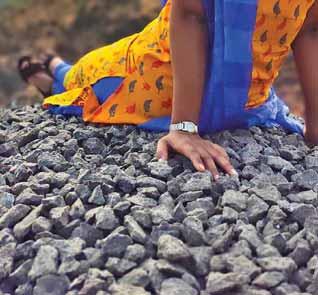

The truth is that human beings need social connectedness to prevent ill-health. We need good social relationships, interaction, human touch, affection and love.
We are of course fortunate that we can connect virtually with relative ease, but that’s not the same. Attending a virtual chat is certainly not the same as getting together with friends in real life.
Perceived social isolation - PSI
Perceived social isolation is the feeling of being alone and isolated. It can be a reality (as it is now) or something one experiences internally even when not alone. One can be lonely even in a crowd for instance. People who have trouble truly connecting with others in reality may face an even greater challenge today.
The repercussions of this sense of isolation that many people may be experiencing today cannot be underestimated and I suspect mental and emotional issues like depression and anxiety will be the next tsunami that will engulf us post-corona.
Good quality relationships matter It’s not the number of friends you have but the quality of the relationships that really matter. If you have even one good relationship/friendship that you can be completely vulnerable, comfortable, it makes an enormous difference to the quality of your life. People who are better connected socially to family, friends and community live longer and are happier.
Analysing several studies on loneliness, authors, A B Bhatti and A U Haq, looked at social isolation and its effects on human wellbeing. The mechanisms through which PSI affects health are both direct and indirect and may be hormonal, neuronal, behavioural, emotional or genetic. The physical isolation can lead to various concerns like
changes in blood pressure, decline in cognitive health (especially in the elderly), sleep problems, depression, increased risk of suicide and suicide ideation, poor eating habits and addictions.
What can we do to stay connected in this ‘socially distanced’ world?
Here are some ideas to prevent PSI and remain connected despite the current situation.
Understand and acknowledge that the current situation is beyond your control. The only thing that you can control is your response to it. Feeling anxious about the present doesn’t help and anticipating a bleak future, (which hasn’t yet arrived) is pointless. Instead focus on what you can control which is, how to stay safe and improve immunity.
Establish a routine for yourself on a daily basis. This could include housework, cooking, working from home, grocery shopping, socialising virtually, virtual exercise classes, webinars and work meetings. Having a routine, however simple, helps you from slipping into the ‘helpless victim’ mode and makes you feel more productive and in control.
Most importantly, establish a connection with someone (or a few people), with whom you can be truly comfortable and trust. Connect virtually with them on a regular basis and discuss your fears and anxieties if any with them.
Reach out with a simple call or message to others who may be living alone or may hesitate to initiate contact. Helping others
is hugely beneficial to one’s own sense of meaning and well-being.
Be conscious of the reality. This kind of lockdown and isolation certainly is bound to create feelings of anxiety. This is a normal response to an unusual time like this. The tendency to self-soothe using food, alcohol or any number of addictive substances is increased many-fold when you are anxious and restless. Be acutely mindful of this and use better alternatives (like exercise, meditation, music) to prevent a tailspin.
Exercise regularly. If you have exercise equipment at home set aside an hour a day for workout. There are plenty of virtual exercise classes available online. Do take advantage of them. If you can walk outdoors during limited periods of time, do so. Exercise combats anxiety and greatly improves mood and positive emotion. You need all the help you can get to keep your mood elevated.
Cultivate positive emotion. You may wonder how does one ‘cultivate’ positive emotion and why?
Positive emotion is a feeling created by the right chemical balance and neural firing in the brain. It can be activated with good lifestyle habits, exercise, proper nutrition, meditation and so on.
Creating positive emotion is important to establish and continue authentic social connections. When you are depressed or anxious, it is hard to connect with others and a vicious cycle is set in motion.
By increasing positive emotion, you are more inclined to reach
Exercise combats anxiety and greatly improves mood and positive emotion.
out and connect with others in an authentic fashion.
Eat healthy. It is tempting to indulge in convenience food. This may also be an excuse to bingeeat or drink. Eating healthy is not just about weight control, but is the key to keeping your gut healthy. A healthy gut influences your brain, preventing depression, increasing positive emotion and helps in clarity of thought. Eating clean at times like this becomes even more critical.
Be grateful. Expressing gratitude (in a gratitude journal for instance) goes a long way in improving positive emotion. Research has shown that people who regularly feel and express gratitude are happier.
While this may be a trying time for all of us, we can use it to reflect, introspect and ask ourselves the important questions in life. We can also make the best of it and stay connected, despite the social distancing and isolation, with a few simple habits. Stay Safe.
The author is a lifestyle medicine physician. sheela.nambiar@gmail.com www.drsheelanambiar.com
Designed by N Krishnamurthy
Rotary Shop ceases operation effective April 1, 2020. Digital versions of our popular publications will be available on Rotary websites, including ‘My Rotary’ and Rotary’s Learning Center. Rotary-branded merchandise can be purchased directly from licensed vendors available through ‘My Rotary’.
For more information, write to rotarysupportcenter@rotary.org
For all global grants (normal/Directed gift/CSR) paid from Rotary Foundation (India), an interim report is due by May 31, 2020, for activities upto March 31, 2020, and a final report must be submitted within two months of completion of the project. Clubs submitting the reports online should also provide supporting documentation (original hard copies), or vice versa.
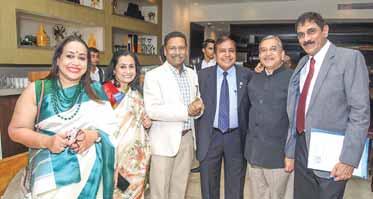
D Ravishankar, past president, RC Bangalore Orchards; Shakuntala Raha, Manager, International Fund DevelopmentRISAO and Paola Ravishankar at the Major Gift Initiative meet in Bengaluru.
The Ministry of Corporate Affairs, Government of India, has announced vide their General Circular No.10/2020 dated March 23, 2020, that spending of CSR funds for COVID-19 is eligible as CSR activity under item No.(i) and (xii) of Schedule VII relating to promotion of healthcare, including
Supporting documents required to be submitted in originals to the Foundation along with the online report submission.
Reporting DocumentationInterim ReportFinal Report
Submit report onlineYesYes
Upload bills/invoices/receiptsNot requiredYes
Upload UndertakingNot requiredYes
Upload beneficiary informationNot requiredYes
All Original Hard Copies Required
Original Utilisation Certificate & Receipts/payment statement
Bank Statement in original/certified true copy
Refund, if anyNot requiredYes
preventive healthcare, sanitation and disaster management.
Clubs/Districts may approach corporates for CSR contributions under Rotary’s disease prevention and treatment and water, sanitation and hygiene areas of focus. Projects will be implemented under the guidelines of Rotary’s CSR funded global grants. For any query write to CSR staff at RISAO, Bhawna.verma@rotary.org or reeti.mondal@rotary.org.
Major Gift Initiative
The Rotary Foundation and DG Sameer Hariani, RID-3190, along with host club RC Bangalore Reach out, hosted an Area of Focus Major Gift Initiative event to support Water, Sanitation and Hygiene recently at Bengaluru. The event was attended by heads of corporate entities, Major Donors, District and zone leaders in Rotary with Trustee Gulam Vahanvaty as the Chief Guest. It opened opportunities for Rotary to partner with corporate units in implementing sustainable community development projects.


Author : Manoranjan Byapari
Translated from Bengali to English by Arunava Sinha
Publisher : Eka
Pages : 178; `360
It’s the early seventies. The Naxalbari Movement is gathering strength in Bengal. Young men and women have left their homes, picked up arms to free land from the clutches of feudal landlords and the state, and return them to oppressed landless farmers. They are being arrested en masse and thrown into high-security jails. In one such jail, five Naxals are meticulously planning a jailbreak. They must free themselves if the revolution is to continue. But petty thief Bhagoban, much too happy to serve frequent terms for free food and shelter, has been planted by Jailor Bireshwar Mukherjee among them as a mole. Only, Bhagoban seems to be warming up to them. There’s gunpowder in the air is a searing investigation into what deprivation and isolation can do to human idealism. And Manoranjan Byapari is one of the most refreshing voices to emerge from Bengal in recent times.

The adivasi will not dance
Author : Hansda Sowendra Shekhar
Publisher : Speaking Tiger Books
Pages : 140; `237
Inthis collection of stories, set in the fecund, mineral-rich hinterland and the ever-expanding, squalid towns of Jharkhand, Hansda Sowvendra Shekhar breathes life into a set of characters as robustly flesh and blood as the soil from which they spring, where they live, and into which they must sometimes bleed.
Troupe-master Mangal Murmu refuses to perform for the President of India and is beaten down; Suren and Gita, a love-blind couple, wait with quiet desperation outside a neonatal ward, hoping — for different reasons — that their blue baby will turn pink; Panmuni and Biram Soren move to Vadodara in the autumn of their lives, only to find that they must stop eating meat to be accepted as citizens; Baso-jhi is the life of the village of Sarjomdih but, when people begin to die for no apparent reason, a ghastly accusation from her past comes back to haunt her; and Talamai Kisku of the Santhal Parganas, migrating to West Bengal in search of work, must sleep with a policeman for `50 and two cold bread pakoras. It is a mature, passionate, intensely political book of stories, made up of the very stuff of life. It establishes the author as one of our most important contemporary writers.
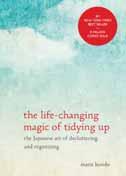
The life-changing magic of tidying up: the Japanese art of decluttering and organizing
Author : Marie Kondo
Publisher : Ten Speed Books
Pages : 258; `1,141
Despiteconstant efforts to declutter your home, do papers still accumulate like snowdrifts and clothes pile up like a tangled mess of noodles?
Japanese cleaning consultant Marie Kondo takes tidying to a whole new level, promising that if you simplify and organise your home properly once, you’ll never have to do it again. Most methods advocate a room-by-room or littleby-little approach, which helps you to pick away at your piles of stuff forever. The KonMari Method, with its revolutionary category-bycategory system, leads to lasting results. None of Kondo’s clients have lapsed (and she still has a three-month waiting list).
With detailed guidance for determining which items in your house “spark joy” (and which don’t), this international best seller featuring Tokyo’s newest lifestyle phenomenon will help you clear your clutter and enjoy the unique magic of a tidy home — and the calm, motivated mindset it can inspire.
Compiled by Kiran Zehra Designed by Krishnapratheesh S
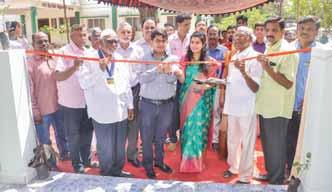
The club members visited the neighbouring villages and distributed groceries to the people as the livelihood for these daily wage earners is affected due to the lockdown.

The club set up a Thalassaemia Care Centre at the Rotary Blood Bank with a global grant ($61,501) under the stewardship of past president Satish Gossain who donated $33,001. The global partner RC Latina contributed a Term Gift of $28,500.

The club constructed a waiting hall and toilet block at the Sub-Collector’s Office and planted trees on the premises. The project costing `1.5 lakh enhanced the public image of Rotary.
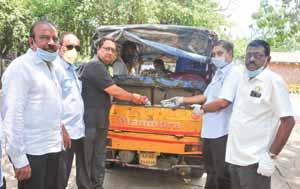
Around3,000 food packets are prepared every day since the start of the lockdown and distributed to the needy. The meals are prepared at the restaurants owned by club members and the project is led by V Basker Ram, an AKS member.
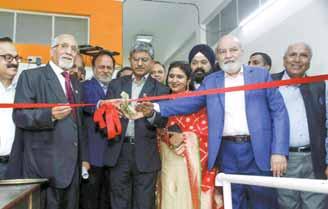
The club handed over 300 face masks to Tahsildar Anil Gavit for distribution to the Asha workers in and around Chopda. The club has erected six hoardings to create awareness on coronavirus.
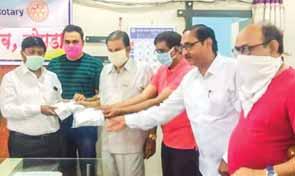
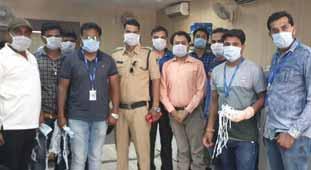
Masks and sanitisers were distributed, along with pamphlets with details about COVID-19 and precautions to be taken, to the public with support of the police personnel.
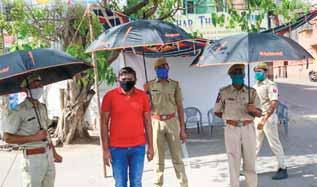

The club members prepared 500 food packets and distributed them to the stranded migrant families with the help of the Corporation staff.

Asanitation drive was organised at the Katra Moti Ram Colony benefitting over 100 houses, with disinfectants sponsored by Past President Sanjay Malik. Former Punjab Health Minister Baldev Raj Chawla and other political leaders took part in the mega drive.
RtnMahendra Jain distributed 300 umbrellas to policemen to protect them from the scorching sun; More than 20,000 food packets were distributed. PPE kits were given to the district hospital to protect doctors and paramedics from coronavirus.
The Rotarians gave long protective face masks to Dr Pradeep Rana, CMO, Civil Hospital, to be used for the medical and ambulance staff. Similar masks were given to the Nagar Palika office for use by sanitation workers.
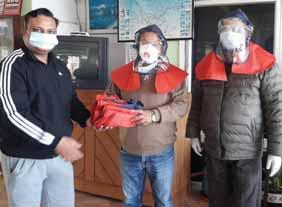
Around250 sanitation kits with masks, soaps, sanitisers and gloves were distributed to protect the community against the coronavirus outbreak. The club facilitated sanitising shops and commercial outlets thoroughly with disinfectants.


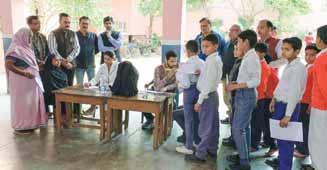
Ageneral health camp was organised at the Saraswati Shishu Mandir in which over 280 students were given consultations for various illnesses. Rotarians supervised the event as doctors examined the children and prescribed medicines.

surgery camp was held at the Hindu Seva Sadan Hospital in association with RC Mumbai North End, RID 3141. Hundred surgeries were done. Medicines and spectacles were given to all patients after surgery.
Adisinfectant tunnel was installed on the premises of Siddh Hospital in the city for the benefit of doctors, paramedical staff, patients and caretakers. This facility will give protection against the COVID-19 infection.

Food grains kits were donated to 15 underprivileged families in association with RAC Panvel Elite. Around 1.2 tonnes of food grains and essentials were given to Ashalaya Orphanage which has 55 children. The club, in association with RC Panvel Horizon, distributed food grain kits to widows to support their families hit hard by lockdown.

DG Harjit Singh Talwar inaugurated a mega medical camp which benefitted 2,500 people. This camp is being organised for the past 14 years, in partnership with local hospitals, voluntary agencies, private firms and Rotaractors.
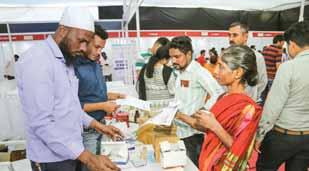
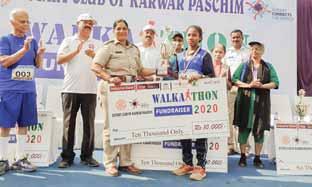
DG Mohan Chandavarkar participated in a health checkup camp organised by all Rotary clubs of Dombivli at the Rotary Health Centre to promote Positive Health project. Vitals such as BP, sugar and BMI were examined in over 100 people.

Rtn Sreenivas and his friends contributed `80,000 to provide food, oral rehydration salts and provisions to the daily wagers, traffic police and sanitary workers at Vijayawada. Besides, club members donated `1.6 lakh to PM CARES Fund.

Around600 people participated in a Walkathon organised by the club as a fundraiser to facilitate medical camps in the region. Winners were honoured with cash prizes.
Agenerator set was donated to Sri Sai Seva Prathistanam, an old-age home, at Daigoli under a DDF grant. Besides, the club gave `4.5 lakh to take care of other repair works and meet general administrative expenses of the home. Woollen blankets and pillows were provided to the inmates.
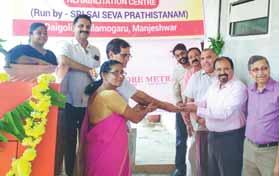
Adisinfectant tunnel, costing ` 1.5 lakh, was installed at the APMC Gate, a busy spot, through which at least 3,000 people pass daily. It will be maintained by the club for three months.

Under its signature Project Firststep, the club sponsored corrective surgeries for four physically-challenged children at the One Care Medical Centre in February. They are among the 44 children shortlisted from a screening camp organised earlier.

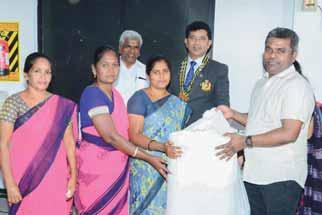
DGA Karthikeyan donated shelves and kitchen appliances worth ` 75,000 to eight PHCs at the Mangalam Panchayat. Besides, an amount of `10,000 each was given to two beneficiaries as assistance for undergoing surgery.

The club is reconstructing a house for an aged woman and her 40-year-old invalid son who were living in a dilapidated house near the sea at Thrikkunnapuzha.

Green
Grocery items were provided to 50 visuallyimpaired people in Virudhunagar to help them tide over the lockdown period.
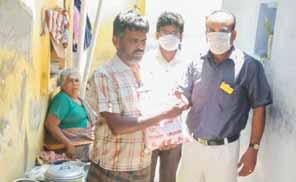
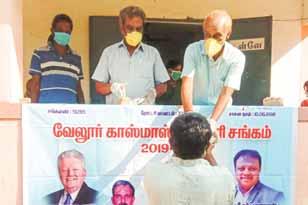
The Rotarians provided breakfast to the vegetable vendors at the local market and at an old-age home during the lockdown. They provided refreshments to sanitary workers and police personnel and distributed food grains for the needy.

Grocery bags and vegetables were distributed to 400 needy families in the presence of government officials.
Project Chairman Jayanta Tetwar was supported by local councillors in his endeavour.
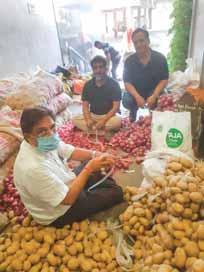

The club members have been distributing lunch packets to beggars, pavement dwellers, migrant families and other needy people since the lockdown as they were left high and dry with no means to sustain their livelihood.
More than 5,000 ration kits consisting of rice, dal, potato, oil, salt and soap were given to daily wagers and their families across various parts of Kolkata with assistance from local police and ward councillors.

Woven through the fabric of virtually every community on earth, service clubs of Kiwanis International, Lions Clubs International, Optimist International, and Rotary International are working safely and diligently to maintain connections with each other and our neighbours so that we can cope with and overcome the effects of COVID-19. We are leveraging the strength of our combined networks of 3.2 million members to provide comfort and hope to those feeling the effects of isolation and fear. And we are focusing our collective skills, resources and ideas to support frontline health workers and first responders as they battle this disease and save lives.
In these times of uncertainty, your local service clubs remain committed to meeting the challenge of finding innovative ways to take action together to help communities around the globe heal and thrive — and become more united than ever.
“The global effort against COVID-19 depends on actions taken in every country. As people of action, this is our time to connect
with each other to offer immediate help to people in need.”
– Mark Daniel Maloney Rotary International President, 2019–20
The scale and magnitude of this global pandemic requires our world’s citizenry to heed the advice and cautions of the experts. The work and plans of our collective members and volunteers must not cease. Our immediate response after the crisis will be necessary to support local governments respond to the many social and economic challenges that will ensue in its aftermath.
– Adrian Elcock Optimist International President, 2019–20
Great challenges test us, but they also bring us together. Lions are finding new ways to safely serve. Our Lions Clubs International Foundation has granted over one million dollars to

help communities facing extreme rates of COVID-19, and additional grant requests are being received daily. Our communities depend on service clubs, and we will be there, supporting and strengthening them just as we always have together.
– Dr Jung-Yul Choi Lions Clubs International President, 2019–20
During these difficult times, we’re seeing everyday heroism across the globe. It encourages us all to recognise the health and safety professionals who are putting their own health at risk for the greater good. To the educators, grocery workers, delivery drivers and the countless professionals who can’t stay home, the Kiwanis family thanks you. We all play an important role in keeping our friends and neighbours safe. Please follow the advice of the World Health Organisation, your local health agencies and the instructions given by your government. Please, stay safe.
– Daniel Vigneron Kiwanis International President, 2019–20
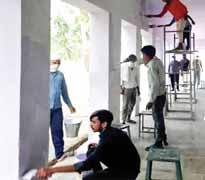
When schools reopen after the lockdown, children studying in the government school in Palsana in Sikar district, Rajasthan, will be in for a pleasant surprise. The school sports a fresh look, thanks to the 54 migrant labourers who were quarantined here during the lockdown. They repaired, cleaned and painted the school building, their temporary shelter, as a show of gratitude to the community that took good care of them.
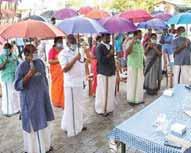
The Thanneermukkom gram panchayat in Alappuzha district of Kerala is distributing large umbrellas to the residents to facilitate physical distancing, and has mandated the use of umbrellas, apart from masks, in all its 23 wards. The State’s Finance Minister TM Thomas Issac tweeted that two open umbrellas, not touching each other, will ensure a minimum 1 m distance. Odisha’s Ganjam district has also replicated this idea.

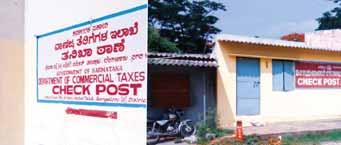
Amidst stringent lockdown, Tamil Nadu (TN) and Karnataka State police helped deliver medicines to a young girl in Theni, TN, suffering from Maple Syrup Urine Disorder. With the lockdown in vogue, it became impossible to get meta nutrients, the required dietary supplement she needed, which her parents were sourcing from Bengaluru through courier. The mother got in touch with Nodal Officer Kavitha, who contacted the dealer in Bengaluru and sought the help of the city’s police commissioner. He arranged to get the packet delivered to the Hosur check post. A twomember team from Theni made a 14-hour journey to the check post and delivered the medicines to the family, and refusd to accept money for the medicines.
Kalku Prajapati (23), undeterred by the nationwide lockdown, cycled 100 km from his hometown, Pauthiya village in Hamirpur, UP, to marry his bride in Puniya village in the neighbouring Mahoba district. The wedding was performed in the village temple. Prajapati found the return journey arduous as he had to pedal back home with his wife riding as pillion!

UK Prime Minister Boris Johnson and his fiancée Carrie Symonds have named their newborn son Wilfred Lawrie Nicholas Johnson. While the name Wilfred is after Johnson’s grandfather and Lawrie after Carrie’s grandfather, the middle name Nicholas was given in honour of the two doctors — Nick Price and Nick Hart — who treated PM Johnson while he suffered from coronavirus infection. He spent three nights in intensive care in early April before his condition improved.
Total number of pages in this monthly issue, including cover, 84. Price: `35
Registered with Registrar of News Papers for India 3880/57 Rotary News Published on the first week of every month

It is time to renew your subscription of Rotary News or Rotary Samachar. Please pay your subscription dues promptly to ensure timely and uninterrupted receipt of your magazine. Have you moved to another address? Update your address immediately with us so you get your magazine regularly. And make sure you mention the right PINCODE.
Presidents/Secretaries, please inform us immediately when you add a new member to your club or when someone leaves your club. Our Email id is rotarynews@rosaonline.org.
Please send your iconic projects in word file and pictures added separately (not embedded) to rotarynewsmagazine@gmail.com.

Payment – `420 per member for 12 months — can be made by cheque or draft favouring ‘Rotary News Trust’ and sent to us at Rotary News Trust, Dugar Towers, Third Floor, 34 Marshalls Road, Egmore, Chennai 600008.
Your magazine dues can also be transferred online at
Bank : HDFC Bank
Branch : Montieth Road, Egmore, Chennai
A/c Name : Rotary News Trust
A/c No. : 50100213133460 (SB Account)
IFSC Code : HDFC0003820
Name of Club
President/Secretary’s name and contact details
Amount/Date of transfer/UTR Number



For physical payment by cheque or cash in bank, write Club Name only without prefixing “Rotary club of”. Eg. Rotary Club of Delhi Central should be written: Delhi Central.
